#which is why such focus has been put on the parallels in their lives to michael and lucifer
Text
I'm here to report on the colors in episode four of Wandee Goodday, but first a few stray thoughts like I have another image to add to my collection of Yak looking at Dee crazy,
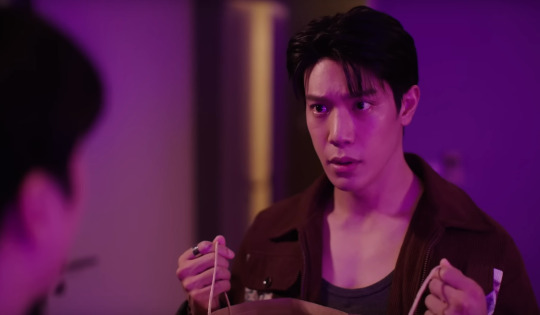
yet still going along with whatever Dee wants.
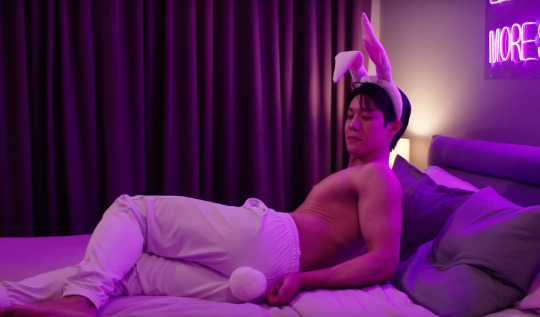
Also, Yak being bothered that Dee didn't immediately think of him as a friend was a good beat in establishing the "friend" portion of their benefits. They are friends who share their lives with each other and scheme together, and I'm glad the show is explicitly stating that.
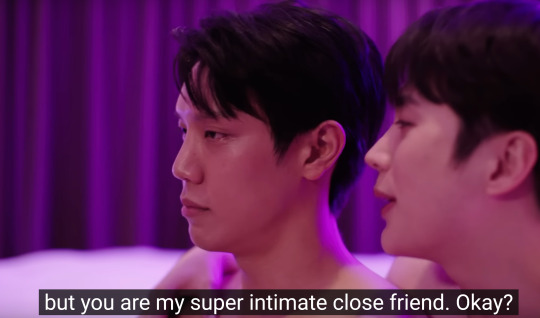
Because the way the conversation began paralleled the way Yak wants to approach Taem about their relationship - What are we? "Are we datin'? Are we fuckin'? Are we best friends? Are we somethin' in between that?"
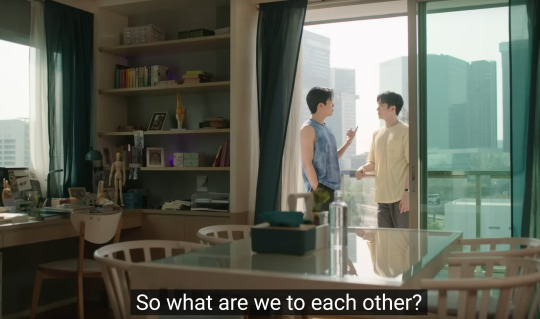
But also the nurse stating Yak must care a lot for his lover to get the vaccine and Yak looking immediately at Dee was perfection because 1) safe sex isn't just about you but about the people you are sleeping with,
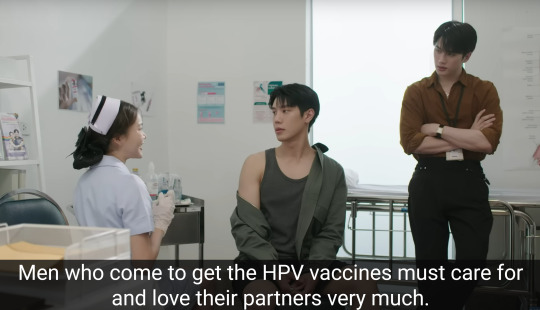
2) you shouldn't be ashamed of caring about sexual health, so even if you hide behind queer pamphlets, drink water, get the shot, wear the condoms, and use the lube. Also, PrEP isn't just for men just like HPV vaccinations aren't just for women, and
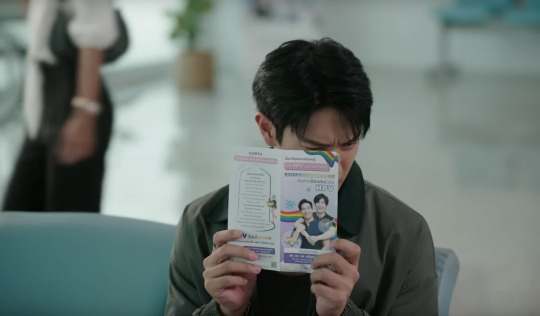
3) it showed that Yak does care enough about DEE, his lover, to take their sexual health seriously -> Yak is on that Bed Friend's King level of sexy, and I'd go through the entire Kama Sutra with them both once all our test results came back clear.
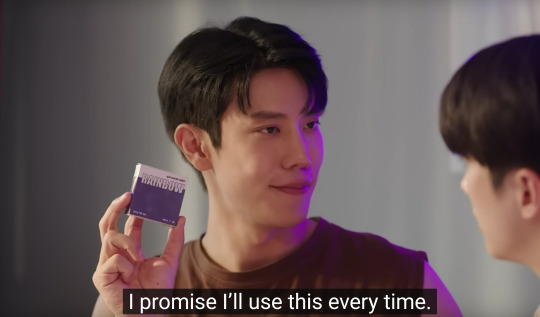
Translations are always iffy but Ter mentioning that Dee wasn't thinking about his professional persona while Yak reminded Dee to not include his face in the pictures and Yei mentioned his brother being fine with Cher when they first started dating gives me hope that this show is going to lean more into the layers of being out because even though that "666" told me Ter was el diablo, he continues to make comments like that and Golf's other show, The Eclipse (which has been featured often in this show) was very much about (not) passing and levels of outness.


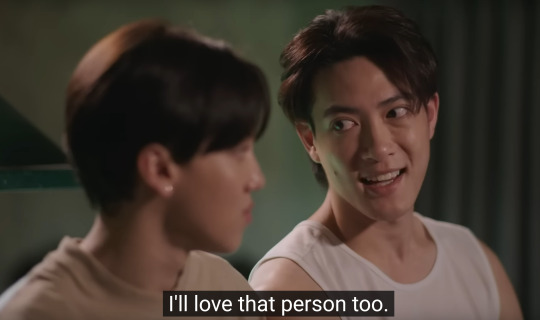
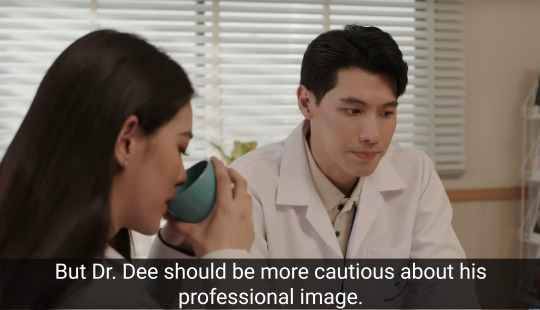
Yei and Yak's dad was a world champion boxer, yet he wasn't mentioned in this mom-focused episode and the mom is the one who opened the gym, so is the space that Cher and Yei are giving Yak to figure his feelings out something they weren't given by the father? Because Cher was worried about the pressure Yei was putting on Yak to move up a class.
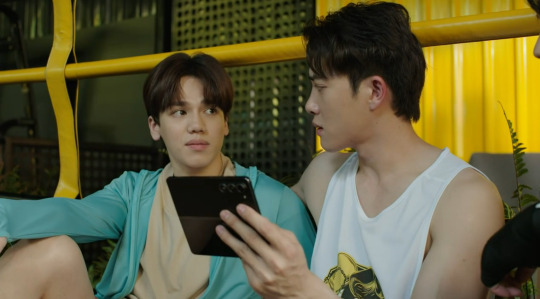
And if the gym was the mom's, with all of its yellow, is Yak really like his mom as Dee assumed?
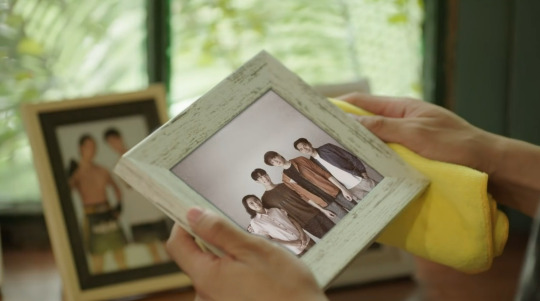
Because putting the opening scenes in black and white is an easy flashback technique, but in this particular story, where Yak and his mom are bright yellow, it was a painfully good choice to take the color and brightness out of the scene.
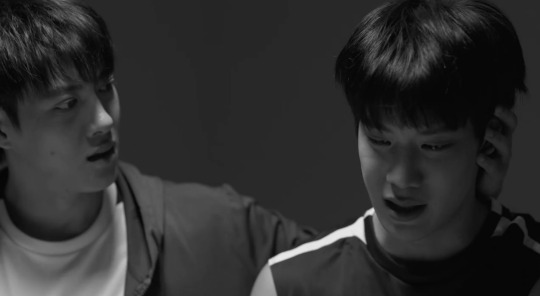
And it was an even better choice to parallel Dee comforting Yak in the same way Yak comforted him with a warmer (yellow) light than his normal purple one.
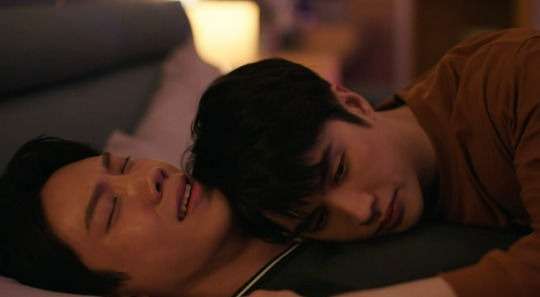
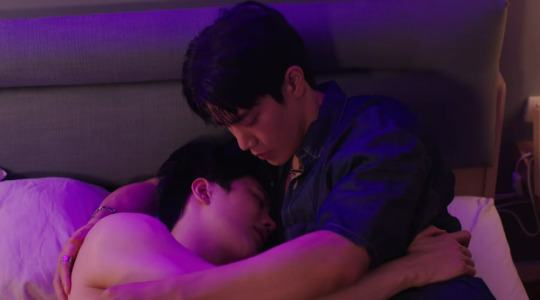
Because Dee is already in his feelings about Yak without realizing how deep he was, which is why he is wearing a soft yellow while Yak is wearing Dee's fake blue.
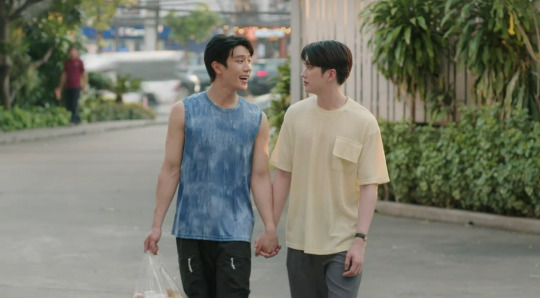
When they practiced what Yak would say to Taem, Dee thought about all their moments together, so he is falling quickly, while the signs are pointing out that Yak isn't there yet.
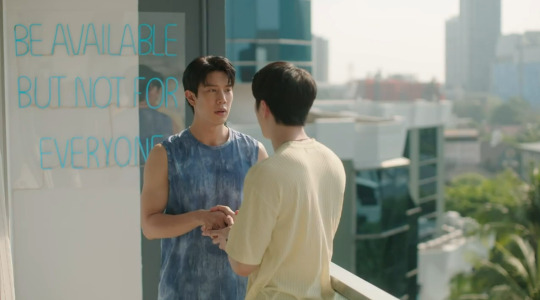
But I wouldn't be there either if I was still daydreaming about this beautiful goddess who always rescues Yak with her brilliance, sassy personality, singular focus, and yellow folders, but that sounds a lot like someone else.
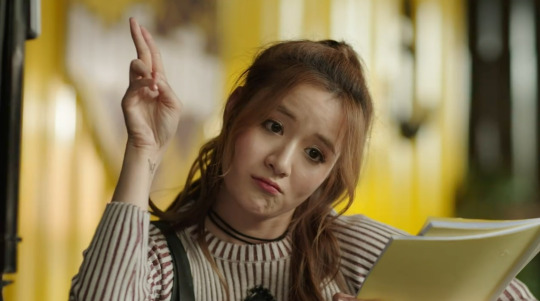
A Purple Prince who is also brilliant and focused on winning but wild and sassy. Good to know Yak has a type. (Sidenote: the music choices swinging between romantic to tension-filled as the scene flipped between Taem and Dee was another great choice)
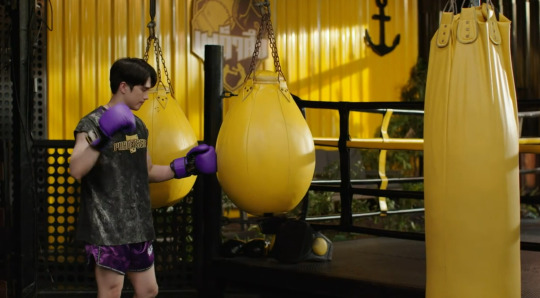
Because Taem is taken, even if not officially. She matches her guy. She had on a dark brown and black shirt, so he had on a dark brown cardigan with a black tie.
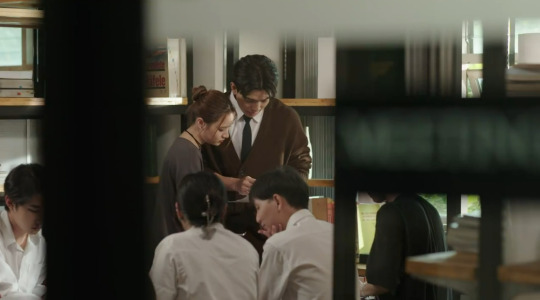
And she had on a brown-striped shirt with a black star, and he had on a brown jacket with black writing and a black tie.
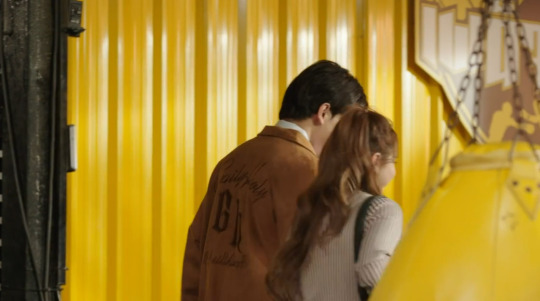
Then again, Dee is no consolation prize. Not looking like that at least.
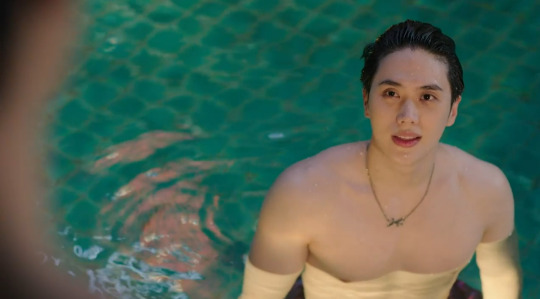
No wonder Yak is conflicted about what he feels when he looks at Dee because he most certainly is sexually attracted to him because *duh* who wouldn't be attracted to Dee (TER!), but as they sit in Yak's black and yellow room, it becomes more apparent that whatever he is feeling isn't just sexual desire.
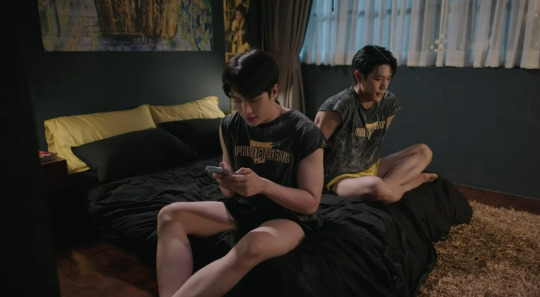
And when Dee scratches his back just like his mom used to while tutoring him, it starts to become clearer that Dee, wearing his necklace, and in orange which is sooooo close to yellow fits easily into his life. (Sidenote: Together with Me taught me that in Thai, being itchy is slang for being horny, so good for this show and its layers)

Dee works so well in Yak's life that Yak is willing to get three shots to continue to have sex with him which can take anywhere from eight months to over a year to complete because each dose is spaced out by at least two-to-six months. Basically, Yak committed to a long-term plan . . . with Dee, who is chilling in his yellow-striped shirt.
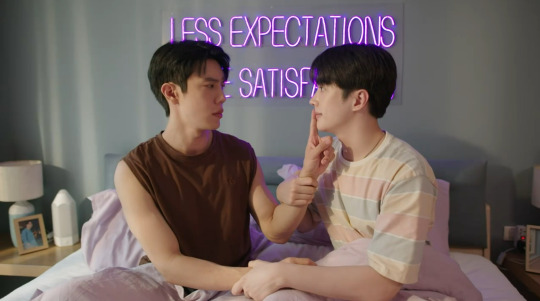
So it's not surprising that Yak is wearing a deeper blue next week as he holds Dee on the couch since he is far more invested in this fake relationship than he originally intended.

I could write 5,000 more posts about them and this episode which I probably will.
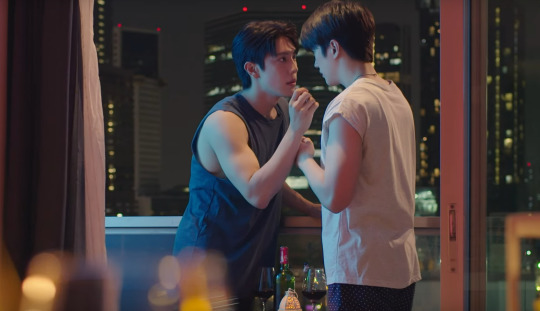
But know that even though the blue Yak is wearing is getting deeper, I will not be satisfied until it turns into purple.

That's when I'll know they are both in love.
#wandee goodday#the colors mean things#color coded boys in love#purple is queer#and Wandee and Yak are gonna be queer af#I'M SO EXCITED!#so excited that I'm putting myself in danger#I gotta chill out#my expectations are so high#what if I don't get purple on Yak?#I'll cry a thousand tears y'all#I'll never recover#don't hurt me show#I have faith you will deliver!
196 notes
·
View notes
Text
timepetals thoughts i keep having:
i know that the assumption is “she is my s-” means soulmate but i always think he just thinks of rose as his soul. less that she completes him or is his other half and more that she just is his conscience and any goodness he may have is hers. he was born out of love for her, she is such an integral part of him, she is his soul itself.
i know everyone has taken permanent damage from the “how long are you going to stay with me” and why the general focus is on the doctor’s reaction but the way rose says forever gets to me. she’s not giddy or girlish when she says it, in some ways she almost sounds resigned to it, which has wonderfully angsty connotations in the timeline of s2. but it’s why it really works for me, she is so dead serious and committed when she says it, because she understands everything it means (and therefore part of her feels solemn about it). it has a lot of weight to it. even the first time donna says she’s going to travel with the doctor forever to martha at the end of the doctor’s daughter she sounds a lot more fanciful.
every time i hear the doctor scream when rose loses her grip in doomsday i just think that he would absolutely not have survived her actually being sucked into the void.
i always think the vocals in doomsday are similar to the doctor’s theme so to me the angry rock music is rose’s side and the vocals are his, rather than the howling wolf idea i’ve heard some people compare it to. how the doctor’s theme is lonely and mournful with its sparse instruments but calm, everything the ninth doctor was, while doomsday is heartbroken and angry and an entire orchestra because it’s two people overcome with grief together. how doomsday becomes such a motif for both characters individually, even when they're separated.
i still struggle to comprehend that the doctor wearing floral ties in s3 is canon and NOT a fanfic trope like you're telling the doctor said "i need a floral motif as close to my two hearts as possible" and you're describing him as something other than a grieving widower???
the doctor really could not go anywhere in s3 without running into some kind of couple but i never see people talk about the parallels in 42. “we chose this ship together / he keeps me honest so i don’t want false hope” and the way the doctor literally gives mcdonnell his condolences through gritted teeth?? the fact that she would rather die with korwin than be without him and have it be her fault
that the doctor, king of self-loathing, saw rose dressed as his ninth self and carrying a giant weapon and he not only RAN to her but then deliberately protected her from the trauma of seeing him change again. and then tentoo immediately picks a blue suit to be like now i’m matchey matchey with rose 🥰 the universe was ending and he’d seen rose again for two actual minutes but the doctor was so utterly focused on her.
how tentoo truly is rose's doctor, especially as he's got that little bit of nine in him. he's born out of the same love and protection of his previous incarnations but he loses a heart and the curse of the timelords and goes oh, this is rose's heart. and then he wears the blue mourning suit and yes, there is still mourning, but there is also the start of the rest of their lives together.
how the doctor’s hair most noticeably changed after school reunion to become spikier and less boyish. how that coincides with him using mickey to put distance between himself and rose now that he’s been reminded of rose’s mortality.
how wild the doctor and jack’s conversation in utopia is. the way the doctor says “rose” like it’s an entire explanation in itself because even before she absorbed the time vortex she fundamentally changed the life of everyone she met. the way he says “everything she did was so human” and the way he accepts jack’s sorry to him because there’s no trying to deny his feelings from jack, not when he saw his ninth self. the way jack has BARELY finished his sentence about watching rose grow up when the doctor casually asks him if he wants to die, the almost playful way he says it. one semi suicidal immortal who spent half of the season trying to get himself killed to another, both of them still kind of toying with the idea. both of them trying to have hope even though they've lost so much.
336 notes
·
View notes
Text

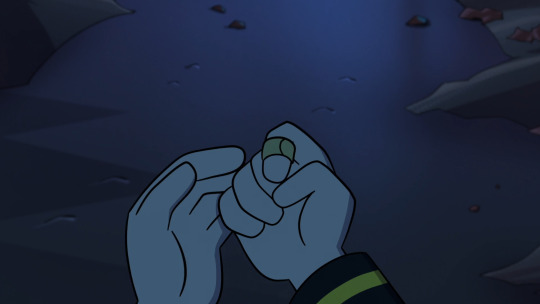

The contrast is so poignant when it comes to Belos isolating Hunter for years and instilling the fear of wild magic, versus Hunter's future in carving palismen to connect with nature and with others.
We have his signature gloves as part of all his outfits before he went to the human realm, representative of that isolation and fear: Belos wanting to keep 'Caleb' to himself, wanting to prevent Hunter from forging connections and thus finding freedom. The gloves come off once Hunter has room to create and experiment and explore.
During the many many months in between him beginning to learn the palismen-carving craft and us seeing him mastering it in the epilogue, there would've been many setbacks. Many cuts and splinters via mistakes (thus, more wounds and scars...small, but numerous) and bandages on his hands, like what happened with the sewing needle.
Thus, many times when he was reminded of what happened with his best friend. I can imagine that on the more difficult days of learning under Dell, remorse and horrible memories eating into him, he'd be more at risk of leaving more cuts because it would be harder to focus. There would've been days where he got close to giving up.
In his arc, this changed everything:

He was found by a free-spirited, strong-willed palisman.
This was when things began to be truly dangerous:

but by then he gathered enough courage to finally question Belos directly.
What a high price to pay. Recovery from trauma is certainly that way in real life too. But it led him on that path towards transformation, towards what he truly wanted.
In his old life, he'd point a staff at others to intimidate, to instill fear, and be Belos's instrument in furthering a cause that Hunter didn't truly support.
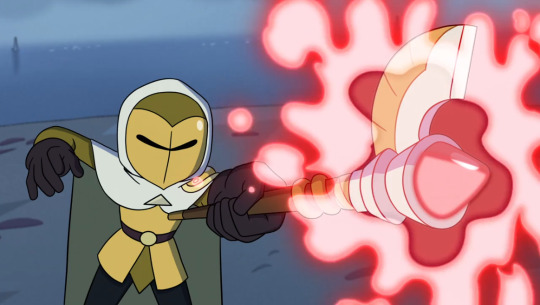
In the future, he generously gives palismen to others from the heart, via new creations made with his own hands, to bring more love, connection and wonder into the world. Letting others live out their truth via the bonds forged with their new palismen, the same kind of truth he himself had to fight so hard for.
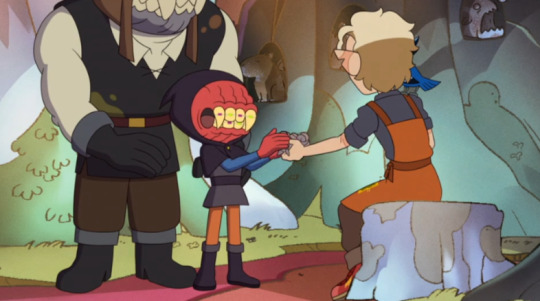
If we rewind back to what the Bat Queen said in Hunting Palismen:
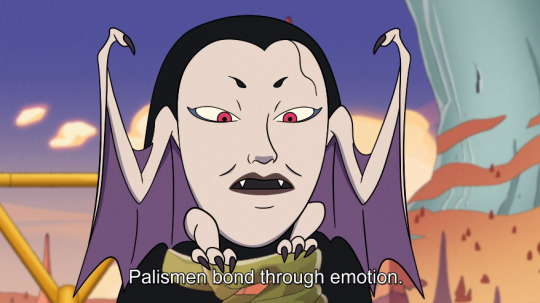

contrast that with this point in Hunter's arc:


Still blocked and numbed out from fully experiencing the worst thing he had ever been through: being possessed and in that process, slaying Flapjack.
Willow and Gus had just began to reach that vulnerability within him, moving him with their love and support (which is why the anger he had for around 2/3 of For the Future began to subside).
But it wasn't enough.
In the finale, he gets some temporary respite and relief:

But I believe the real gruelling work was to begin beyond this exact point:

More vulnerability ahead, to pave the way for healing.
Putting the scene of him looking at the old Flyer Derby photo (in For the Future) next to the scene where the Bat Queen sums up what palismen are all about...it indicates to me how steep the climb would be to connect with the full range of his emotions and memories, which parallels his development under Dell's mentorship. To bring some beauty out of that horror he has endured. To bring about the conviction that yes, he deserved Flapjack's gift, from Flapjack's sacrifice.
It would've been years before he would confidently and effortlessly rest in the truth of who he really is, and who he would like to be (remember his "Even if I'm not who I'm supposed to be, I like who I am right now" in front of the mirror, right before getting possessed?).

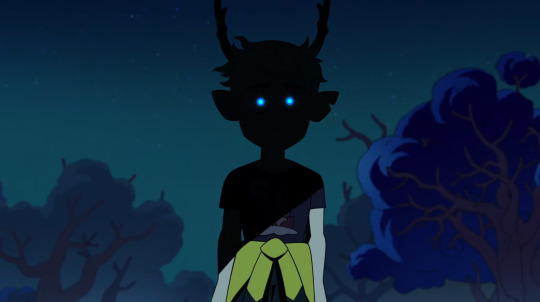
Liberating himself from enmeshment with his violent abuser and that old life, a process he'd have to repeat again and again even beyond Belos's death. Changing that narrative of "supposed to":
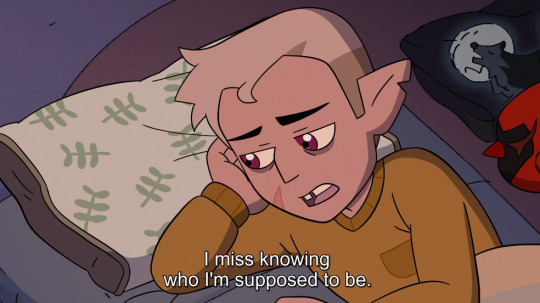
into freely choosing the person he would like to become after Flapjack granted him love and literal life. We receive the one clue that he wanted to freely choose, as early as this scene:
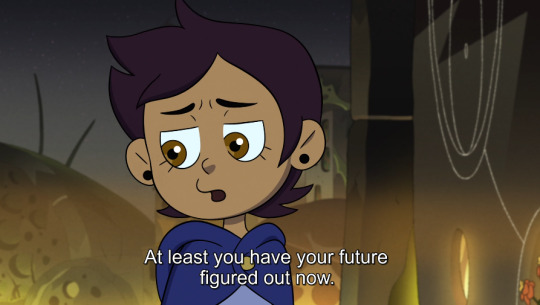
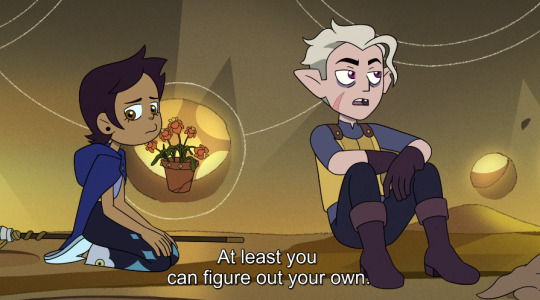
When it comes to palismen, we have "emotion" and "conviction" and also the deepest wishes that witches have in their hearts.

For emotion to flow freely, there must be vulnerability, generosity and love: Hunter integrating even the most difficult emotions into his story.
For him to grow into acceptance of his future major role, it would have involved wrestling with many questions to reach that place of conviction.
#whoops I got emotional. again. now you guys get this#the owl house#toh hunter#palismen#the bat queen#loz writes a meta
685 notes
·
View notes
Text
People keep saying Katniss is like the reincarnation of Sejanus, or even Lucy Gray, which I just don’t think is true. If there’s a character in the movie that reminded me of Katniss it was Reaper from District 11. Both had an advantage in the game from their trades (Katniss was a hunter and Reaper was a lumberjack, I think). Despite this, both chose to ally themselves with young girls (Rue and Dill respectively) over the older, stronger tributes. And they both have to watch this girl die. I saw way more of Katniss in Reaper tearing down the Panem flag to cover his fellow tributes after finding Dill dead than in Sejanus sprinkling breadcrumbs over Marcus.
What this movie made me sure of is that there must have been so many tributes like Reaper and Katniss. While we see some tributes driven to do awful things to survive, we also see so much love and mercy – in Reaper immediately telling Dill to stick with him in the arena, in that little girl taking Lucy’s hand, in Lamina mercy killing Marcus’ and cutting his body down.
I also don’t think Snow felt especially haunted by Lucy Gray in Peeta. While I think the two are a lot more alike than Sejanus and Katniss, Snow has seen dozens of games since the 10th. While Lucy was the first of her kind, I’m sure there have been so many tributes like Lucy, who try to use charm and personality to win over the audience as opposed to relying on physical strength. The games were literally reshaped to give tributes like her a better chance. We hear over and over during the first book how likability is the key to surviving in the arena.
Ultimately, neither Katniss nor Peeta are unique as tributes. Peeta isn’t even unique as a victor – while he was an underdog, I’m sure there have been at least a couple other victors like Peeta and Lucy Gray who managed to get by. I do not, however, think there had ever been a victor like Katniss. That’s what’s different between her and Reaper, and why Katniss successfully inspired a revolution while Reaper, who rebelled against the games in almost the same way, did not. Reaper died as an act of defiance against the Capitol, while Katniss lived. They both ultimately refused to play the game, but Katniss proved that resisting the Capitol was not a death wish. And that is what scares Snow. That's why he needs her to frame it as an act of love for Peeta. Not because she reminds him of a dead revolutionary, or even of a dead friend (although idk if I would even call them friends tbh).
(I feel I have to add, the capitol was clearly threatened by what Reaper did, or Gaul wouldn’t have interrupted him with that announcement. Also, we don’t see how 11 reacts to Dill’s death like we do with Rue, it could have also resulted in riots. But Reaper died where Katniss did not. There’s that line Snow had in the first movie about needing to control how much hope they give the districts, and clearly Katniss surviving pushed them across the threshold)
But Katniss and Reaper were not rebels or revolutionaries going into the arena. Yes, they hated the Capitol, but what tribute wouldn’t? Their priority was survival and helping Rue and Dill survive. It was the deaths of their friends that sparked their rebellion. Sejanus, on the other hand, had little to no concern for survival. He was consumed with his hate for the games and the Capitol (he was choking on it).
If I had to make a parallel between Sejanus and someone in the original trilogy, it would be Cinna. They both live in the Capitol, on a path of upward social trajectory, and despite that neither of them are willing to live with what the Capitol is doing, and it kills them. Snow even causes both their deaths.
I also had to consider that Katniss reminded Snow of himself. Both of them start out their respective books with very little consideration with the big picture. Their focus is on improving the lives of themselves and their families. I think that is how Snow knows where to put the pressure to keep Katniss in line. (Coin does not understand this, and it’s why she struggles manipulating Katniss into doing what she wants). But unlike Snow, Katniss doesn’t feel ownership over her loved ones, and her idea of ‘doing anything for them’ means sacrificing herself, not the lives of others.
I don’t think Snow was haunted. I think that requires feeling guilt or regret. After Lucy Gray ran away, Snow got married. And had children. And grandchildren. He hosted more games and killed more district kids. He might have cried after what he did to Sejanus, but he then immediately took the money that would have been Sejanus’ and used to do things that would have had him doing barrel rolls in his grave.
Snow at the end of the Hunger Games trilogy does not strike me as a man who is haunted by his choices. Like he told Lucy Gray, he came to believe humanity is innately evil. When you think that, you can do as many horrible things as you want to, because there will never be an innocent victim. You’re just doing to other people what they would do to you - if they were as smart and cunning and powerful as you are.
#a ballad of songbirds and snakes#katniss everdeen#peeta mellark#sejanus plinth#coriolanus snow#lucy gray baird#the hunger games#reaper ash#okay ill stop talking about this movie now#m#abosas#abosas spoilers#a ballad of songbirds and snakes spoilers
185 notes
·
View notes
Text
Okay. I’ll write an actual analysis.
A Lonely Place of Dying does a few things, storytelling-wise, that are actually incredibly impressive. Like, I figured it out and I was so excited.
First, we don’t see Tim. Not in part 1. All we see is glimpses. His hands as he puts away his camera. His feet as he runs away from Starfire’s apartment. We only see small parts of him, leaving him shrouded in mystery, which leads into part 2, where he’s represented by a shadowy figure on the cover.
The Titans, but especially Starfire, are all worried about the small child looking for Nightwing. This kid knows Nightwing’s name, knows where he lives, nd has a very conspicuous camera. I’d be worried too! So of course, from the Titans perspective, he’s an intimidating opponent that they don’t understand. (Especially since I’m like ninety percent sure Tim isn’t actually the one they’re looking for. Like, I think it was just a happy coincidence that the most suspicious child on the face of the planet happened to show up at the same time as the actual problem.)
We don’t see Tim’s face until just under halfway through part 2. And the first thing they show us are his eyes. He’s searching for Dick, even among all the pandemonium, and it’s only upon him finding Dick that we see his whole face.
Tim’s eyes are important. They’re an important part of his character in this storyline. Because Tim sees things. He sees through Bruce, he sees through Dick, he sees through Alfred even. He’s always looking.
And this is compounded when he explains how he knows what he knows in part 3.
We see child Tim Drake at the circus. Tim says this to Dick “…I kept staring at you…” and this “I remember waiting for you to go on. And then, when you did, I just sat there and watched.”
On the next page, he says, about Dick’s parents’ deaths, “I turned away… I couldn’t watch. Then I heard you crying and I turned back and I saw you holding onto them, and I began crying, too.”
Page 11 has his monologue about seeing Batman for the first time, and how he thought Batman would hurt Dick, but what’s important isn’t the dialogue, it’s the panels. They focus on the realization of Batman being safe, entirely through Tim’s eyes. He’s panicked and scared, then slowly relaxes. We see it all, because Tim sees it all.
And it’s THIS. Tim started the story by finding Batman, but he starts his story by beginning to look for Dick. Us seeing Tim seeing Dick is a direct parallel to us seeing Tim seeing Batman with Dick. Tim’s story starts by him staring at Dick, unable to look away. And when we see him for the first time, he’s looking at him again, still unable to look away.
Throughout the story, Tim is constantly looking at Dick. Yes, this is mostly because he’s talking to Dick, but even at the end of part 2, when Dick is being congratulated by Haly’s Circus members and isn’t paying attention to Tim at all, Tim is still watching him.
Why is there so much emphasis on his eyes? I’m so glad you asked- IT’S VISUAL STORYTELLING BABEYYYY.
Tim’s most important role in A Lonely Place of Dying is as a third party. He cares about Bruce and Dick, and he knows them a lot better than they might think, but he’s still a third party to them. They don’t know him. He’s someone who’s been looking in on their lives for ten years.
He’s. A. Voyeur.
The emphasis being placed on his eyes cements this. Dick, Alfred, and Bruce are all put off by him at first. He knows too much, he doesn’t offer much information on himself until he’s forced to, it’s almost uncomfortable how much of a stalker this thirteen-year-old manages to be. He’s a voyeur, watching their lives, unnoticed by any of them, and that’s a bit unnerving! I don’t blame Dick for being unsettled by him, he’s weird!
And, his eyes as a child watching Dick to his eyes as a preteen finding Dick. They’re connected. A perfectly linear story, just told backwards. It’s really very satisfying.
Now, point two. The question we all have. Is Tim a stalker?
Short answer: yes.
Long answer: yes, but I’ll explain.
Tim begins the story by taking pictures of Batman fighting Ravager. The narration mentions someone calling in a tip to Gordon about Ravager’s location, which is what led Batman to this point, and I’m on the fence over whether or not Tim was the one who called in. On one hand, it would make a lot of sense. Ravager is part of a bigger ploy by Two-Face, and we find out in part 2 that Tim knows Two-Face is behind the trouble. It would also explain how Tim found a spot to set up his camera for a good portion of the fight. And, it isn’t like Tim wouldn’t know Gordon’s phone number. On the other hand, it’s never explicitly stated who called Gordon, so assume what you will.
Part 1 actually shows us a glimpse of Tim’s collection of photographs. It’s huge. Most of them are obviously newspaper clippings, but a few are just pictures (I assume on photo paper because the edges are cleaner than the newspaper photos). Tim says, in part 3 “You know, since I was able to read, I clipped every article on Batman and Robin.” We admittedly don’t know when Tim learned to read, but he’s thirteen and says he gets mostly A’s, so I’m assuming he probably learned in preschool or kindergarten, around the age of 3-5. That’s a lot of newpaper clippings. We only see his more recent and his most stalkery ones, so who knows how many more he has?
There are only a few points in the story where we see that Tim is genuinely emotional about anything. For the most part, he is calm. He smiles a lot. He doesn’t use a lot of exclamation marks. The only times he does use exclamation marks are when he’s monologuing (internally or externally) about how great Dick is or when he’s trying to make a point. The only time we see him get visibly distressed is when Dick ignores him about Batman needing a Robin.
I don’t know how to stress upon you that Tim only cries that one time. Tim almost dies three times in this comic. He went to his second circus and another person died. His idols both berate him and talk down to him (although Dick stops right after they meet with Bruce. I’m going to be honest, I think Dick wants Bruce to take Tim on as Robin because if Dick had to deal with Tim for a whole day, so does Bruce). He has to recount watching Dick’s parents die and the nightmares he got from it.
He went through so much. But, the only time he’s upset is when Dick won’t listen to him about what’s best for Batman.
Anyway, Tim flat out just says a lot of really stalker-y shit, so I’ll just list some more:
We already know about him clipping newspapers since he could read
When he’s asking Kory where Nightwing is, he lets slip to her that he was watching Titans Tower with this line “I know he wasn’t at your meeting today.”
There’s also a few lines from breaking and entering Dick’s apartment “Grayson kept his old apartment. If he left the Titans, he might be here.” “He’s a detective… he must keep notes. Even something scribbled on a shopping list.” “No! The Haly Circus is closing? It can’t be! It can’t! But at least I now know where he is!” (Why is the shopping list thing stalkery Kacie, I’m so glad you asked. Tim knows Dick well enough that he knows Dick writes things down. Bruce certainly doesn’t, and Bruce is also a detective, so it’s a logical leap unless Tim knows Dick is inclined to write things down.)
There’s one part that isn’t stalkery so much as really funny to me. While Tim is looking for Dick at the circus, he realizes that Dick is “a master of disguise” and that “I’ve been looking for Dick Grayson, but he could be anyone.” only to almost immediately after say “No, not the roustabouts. They’re too tall.” First, that means he can’t “be anyone.” Second, he knows Dick’s height just. So well.
Tim realizes who Dick is and I think I’ll just tell you what he said to explain how he figured it out “Th-that jump- - -that’s him! It’s got to be Dick!” What was so special about Dick’s jump? I don’t think there was anything special, I think Tim is just weird.
Dick asks Tim who he is no less than three separate times. Tim refuses to tell him, all three times. At the beginning of part 3, while Dick is introducing Tim to Alfred, Dick says “Alfred, this may be a bit awkward, but I’d like you to meet- - - -what did you say your name was again?” Implying that Tim did tell Dick, but only briefly.
Back in part 2, Tim says this to Dick “Look, I know you’re Nightwing. You used to be Robin. Then Jason Todd became Robin, and when he died, Bruce Wayne went to pieces.” Tim says this before telling Dick his name by the way.
Tim, upon being introduced to Alfred (a cont. of the earlier Dick line) “Tim. Mr. Pennyworth- - gosh I was really hoping we’d meet. I know you’re Batman’s confidant, and I’ve dreamed about the stories you could tell.”
Alfred’s response to this is “I am- - what did you say?” Which is very funny.
Some more stalker lines that come from Tim looking around the manor: “I’ve seen pictures of this place,” “There’s the renoir Mr. Wayne bought last year. I read about that in Art World Today.”, “He’s got an erte? Oh, I love his stuff.”, “Please, can I see the rest of the house?”
There’s this, which a part of was mentioned earlier “I don’t remember the clowns or the animals, or anything else. I just remember waiting for you to go on. And then, when you did, I just sat there and watched.”
Tim says, before explaining anything, “Okay, you won’t take me seriously until I tell you everything. Dick, I don’t want this to hurt you. And I’m really afraid it might.” He then says, “I’m sorry, Dick. I really am. I told you I didn’t want to hurt you by telling you all this.” Tim is right, Dick is hurt. Tim is a stalker, but he’s a conscientious stalker.
There’s this “That image of you doing your somersault- - - -it stayed with me for years. I couldn’t get it out of my mind.” “I knew that somersault. I knew it like I knew my own name.”
This is just the beginning of a sentence, but it still is very stalkery “When you moved to New York to become Nightwing…”
Or how about “…Batman and Robin have meant everything to me. I’ve followed them both… I know them so well. I knew when Dick left to become Nightwing. I knew when Jason came and became Robin… and I knew when Jason died.”
Tim mentions offhandedly that he managed at some point to slip a tracking device on Two-Face. An impressive feat, considering Two-Face was trying to hit him with a crowbar and Tim only came into contact with him twice, either to punch him in the face or push him away from attacking Alfred. I doubt he slipped it on him while punching him, but his ability to stay calm under pressure even while acting panicky, managing to smoothly slide a tracking device onto Two-Face that Two-Face never realizes is there, is very impressive. Or, it’s practiced-
Bruce says “I don’t want a partner. It’s as simple as that.”
Tim responds “After all you’ve been through, I understand.”
So you may be wondering, with all of this overwhelming evidence and the fact that he knows where both Kory and Dick live and the fact that he already knew Alfred Pennyworth was Batman’s confidant and all of the weird, supervillain-esque shit he says, why does anyone like him?
And I’ll tell you why. It’s because he’s so fucking awkward.
Tim says things like “oh thank goodness” or “gosh” or “it’s still been wonderful.” Tim stutters talking to Batman. Tim fanboys over Dick and Bruce constantly. He isn’t even upset to have gotten a mystery wrong, he’s just happy he got to see Dick solve a case.
But also, Tim is right. Batman is acting recklessly, and it’s directly as a result of Jason dying. Tim says he needs Robin, not Nightwing, but I think what he means is more the role that they fill. Robin is little and Bruce can tuck him under his wing and keep him safe. Nightwing is an adult who argues with him and is a good leader in his own right, leading to more arguments. Robin is someone Batman has to take notice of, has to account for when making plans. Nightwing can keep up, and he isn’t as worried about Nightwing because he trusts Nightwing’s ability to stay alive. They fill very different roles, and that’s what Tim means, even if he has trouble saying it.
And he’s completely right. Batman without Robin runs recklessly into a building without scoping it out, tries to save two boys tied with active grenades by himself, walks into a room full of mobsters with guns without having any protection himself. Tim implies that he’s worried Bruce might die, and he’s right to be worried.
But even with Nightwing there, Batman only worries when things go wrong. He doesn’t see Dick as his scrappy little sidekick anymore, he sees him as an adult. And it’s only when Dick’s in trouble that Bruce reverts to treating him like a child.
Robin makes Batman stop and think before they go in. Robin makes Batman patient. Because Bruce cares about Dick and Jason, and he comes to care about Tim too.
Tim wins him over by being clever, but later comics show that they have to build trust in each other. Tim trusts Bruce completely, right off the bat, and that’s overwhelming for Bruce. But Bruce stops being overwhelmed and starts feeling fond.
Because despite everything I said, Tim is a good person. He’s so worried about Bruce that he’s willing to search everywhere to find Dick to try and help him. He’s so worried about Bruce that he spends his vacation week slumming around on his bicycle trying to save Bruce’s life. He dives down a coal chute without a second thought, and he pushes with all his might to unbury Batman and Nightwing. He cares about them, and it’s painfully obvious that he does.
Tim doesn’t want to be Robin. Like, okay, he would love to be Robin, but that’s not why he’s here. He doesn’t want to tell Dick his first name, and it’s only after seeing that Dick isn’t taking him seriously that he spills the beans. He didn’t want to tell Dick, because that would hurt Dick. He says “B-Batman, it’s hard for me to say this to you” because he’s about to tell Bruce off for being reckless and he doesn’t want to. Tim wants to know that Bruce and Dick are safe, and that’s the only thing he wants.
Yes, Tim is definitely a stalker. He literally said himself that he followed them, and even if it was only through newspapers, it still counts as following. Now, maybe he doesn’t fit this dictionary definition of a stalker: “a person who harasses or persecutes someone with unwanted and obsessive attention,” but I think he does fit this dictionary definition: “a person who hunts prey stealthily.” Tim is stealthy and quick.
I read an article that said his weakness was unexpected situations, but I would argue that that’s bullshit. Tim is great in unexpected situations. Did he expect Two-Face to start trying to beat him with a crowbar? No, but he managed to avoid being hit and plant a tracker on him. Did he expect Two-Face to crush the Batmobile he’s sitting in with a wrecking ball? No, but he managed to jump out and hide and tried to warn Batman and Nightwing to watch out. Did he expect Bruce to agree to let him train to be Robin? No, but he’s going to do the best he can now that he has the chance.
From the very beginning, we can see that Tim is someone with an answer to just about everything. He knows things, he notices things, and he’s good at reacting. Later comics don’t dispute this, that I know of. Tim is the Robin with multiple contingencies for his contingencies, but he’s also the Robin who is most likely to say “oh shit I did not see that coming.” He’s a surprised sometimes, yes, but that doesn’t mean he’s unprepared.
All in all, Tim Drake is a fascinating character study of a rich kid who talks like an elderly woman providing therapy for a man who is at least two, if not three, decades his senior. Tim doesn’t quite understand at any point that monitoring isn’t the same thing as showing affection, which is why he and Bruce get along swimmingly and why Tim is often slated to be the Robin most alike to Batman.
Congratulations, Tim.
Also, I really truly believe that Tim had his first crush on Dick, which is why he couldn’t stop staring at him. And I didn’t mention he said this, because it wasn’t important to the points I was making, but it’s important to this one. Tim says “…I kept staring at you, and your circus costume.” The circus costume being similar to Robin’s is never brought up, only the fact fact that Tim couldn’t stop staring at it. I’m telling you, his first crush was here, it’s so obvious, just look at my corkboar-
#the inane ramblings of a madman#dc#batman#robin#tim drake#bruce wayne#dick grayson#alfred pennyworth#a lonely place of dying#long post#like so long#i’m so sorry but also not really#had to take my mom to the hospital at 5am and waited there for six hours#you guys can suffer through some ramblings#anyway#been thinkin bout timmer lately#so i reread his introduction#him being introduced as a shadowy figure with unclear motives#will never not be funny to me#kory shouting ‘wait how did you know where i live’ always makes me giggle#tim is a head shorter than dick#starfire is taller than dick#i have to imagine that tim goes up to her shoulders#like he does with batman#he’s just an intimidating little guy#no wonder he does so well as batman later on#also dick says ‘you can’t bring the dead back to life’#and i had to google when jason was brought back#just so i could make the joke ‘won’t he feel silly in 16 years’
154 notes
·
View notes
Note
Hello!
I would like to ask if there's already a post a long the lines of "Why Rosegarden is a good ship" or reasons to ship RG? If none would it be alright to ask for your insights?
It's my first time being interested in them but I just can't wrap it around my head for now. I would love to read about them!
Thank you in advance ^^
Hi Anon!
I have not yet made any posts specifically with these questions in mind, no. Just a small, unfinished, series about why I believe the ship is likely to be canon. I am happy to offer some insight, but I don't know that I'm going to give you the answers you're looking for. 😅
First and foremost, the questions you're asking aren't really ones that can be answered objectively. What makes a ship "good" or "bad" is largely subjective, as there are as many ways to view a ship as there are people viewing it. I could make an argument about how I think it is - objectively speaking - a well written pairing that follows the typical beats and tropes (with delightful subversions) of a good romance arc, that also parallels how other canon ships within RWBY have been established... but at the end of the day, if you're not a fan of what RG is about, then there's not much I can say to change your mind.
Which brings me to your second question. The best reasons to ship RG are going to be the same reasons for why anyone should ship anything: ship it if you want to, ship it if it resonates with you, and ship it if you enjoy it.
If their characters, interactions, themes, parallels, allusions, tropes, symbolisms, foils, designs, messages, etc., aren't your cup of tea, it's completely okay if you pick something else on the menu! So long as you don't like. verbally harass people that do like it or fill the tag w the same discourse that we are all very tired of seeing.
I don't know if that is a sufficient answer to your question, so I'll take a chance and also provide some of my personal reasons as to why I think it's "good" and why I ship it. While there are many reasons I can't all include, the main things are just how much they mirror each other:
From their complementary character designs (red vs. green, silver vs. gold, moon vs. sun, etc.),
To shared fairytale allusions (Little Prince and the Rose, Dorothy and Princess Ozma/Tip, Warrior in the Woods, etc.),
To the narrative parallels (both being the youngest of the group when they joined respectively; how both of their attachments to each other keep being put into focus; to their shared themes around choice and identity: Ruby having chosen adventure but feeling as if she has no choice but to keep moving forward, while Oscar was chosen by adventure but chooses to do what he can despite his circumstances; Oscar not knowing who he is because of the merge and asking: "I'm just going to be another one of his lives, aren't I?", versus Ruby not wanting to be who she is after chasing the the ghost of an unachievable ideal, but being asked "what if you could be anyone?"; how they're both just kids thrown into war and unfair responsibility before they even have a chance to figure out the kinds of people they want to be, etc.),
to perhaps, most importantly, the show of mutual support between the two of them.
Ruby supports everyone as best she can. She is always giving to and supporting others as a show companionship and leadership. But thanks to V9 and also E4 of RWBY Beyond, we know this was not sustainable or sufficiently reciprocated.
She was let down by Weiss who constantly managed to hit her right in her insecurities; let down by Blake who - even while trying to uplift her - just ended up adding more pressure by treating Ruby like a role model; to Yang and Qrow who both tried to support her as best they could, but kept comparing her to Summer in the process; to Penny having so much of her own lack of experience, stressors, and very immediate worries going on that she couldn't offer Ruby the support she needed even if she wanted to; to Jaune flipping his lid at her and pointing the blame even when he himself was guilty and knew he was out of line; to Ozpin, Qrow, Maria, Tai, Summer, Cordovin, Ironwood, etc., all being adults who could have taken responsibility or done the right thing, but fumbled or failed leaving her to pick up the pieces in their wake.
But Oscar?
We see it from Oscar's introduction that he - like their shared fairytale allusions - is in awe from the moment he meets her. But after one conversation about the weight of her grief, trauma, and the responsibilities she is carrying - a conversation she has not had with anyone else up to this point - he immediately sees how heavy Ruby's burdens are. Saying, as early as V5: "This must be really hard on her too". And while it is subtle, he never stops looking after her as best he can as the volumes go onward ("Looks like you're needed elsewhere."/"You're sure?"/"Yeah, I've got it."). However, it's only in V9 that her sister Yang is asking "why didn't she just talk to us?". It is only in V9 when her partner Weiss admits: "Maybe it's because she didn't feel like she could". It is only V9 when Ruby finally lays her burdens out to someone else again, this time to the Blacksmith, after almost having given up completely.
For a character who's 116 episode long arc has been about carrying the weight of responsibility far beyond her limits, never asking for anything in return no matter how difficult it gets... to meet another character that instantly notices her struggles and makes a conscious effort to help where all others have failed? To have one conversation and say "that looks heavy, let me help you carry that" without her asking or waiting for an answer? It's just one of the most beautiful acts of care I can think of. The themes and the parallels all resonate very strongly with me on a personal level, making it - in my humble opinion - a brilliant, and very stable foundation for a relationship, and for a story.
Thank you for your question, I hope I was able to offer some of the insight you were looking for. 💕
#i could have spoken about the reasons by most people say they don't get the ship and broke down the biases behind them#but that veers too close to d/scourse and didn't feel as productive#ask#asks#anon#rosegarden#rwby rosegarden#why i ship rosegarden#ruby rose#oscar pine
41 notes
·
View notes
Text
getting emotional about the last issue of sandman again (cw for major comic spoilers, discussion of suicidal thoughts)
because like. so we learn pretty early on what dream's deal with shakespeare was, allowing him better access to his creative potential in return for two plays, and we know this because we get midsummer night's dream, which was commissioned by dream for the actual titania as a parting gift before the faeries left earth forever
but we don't learn the second play until right at the end, after dream is dead, after the funeral, after sunday mourning and exiles, both of which make really beautiful endings to the story in their own right
the second play is the tempest. and there's a lot of the play that neil gaiman quotes in this issue, but i'll focus on the specific two that shakespeare reads aloud
the first is our obvious one - prospero's address at his daughter's wedding.
Be cheerful, sir. Our revels now are ended. These our actors, as I foretold you, were all spirits and are melted into air, into thin air. And like the baseless fabric of this vision, the cloud-capped towers, the gorgeous palaces, the solemn temples, the great globe itself, ye all which it inherit, shall dissolve, and like this insubstantial pageant faded, leave not a rack behind. We are such stuff as dreams are made on, and our little life is rounded with a sleep.
it's a beautiful passage, and exactly what to put at the end of this story - prospero is reminding everyone that stories are just stories, they aren't real and can't hurt anyone, but also they are the one thing that lives forever. humans are shaped and formed by our dreams, by our stories, we come from them, and in the end, we return to them.
now, prospero is the character we focus on in this issue. because there's a three-way parallel here between dream and prospero and shakespeare himself.
dream and shakespeare have both lost their sons, were both irreparably changed by that. both regret decisions they've made in their lives, and wish to leave the path they've found for themselves, but don't feel they can - their responsibilities are too great, they have no choice but to be what they were born to be. both wonder what might have happened in a world where things were different, but they know that could never have been
and prospero is the balm to that. prospero has made mistakes in his life, he's in several ways the antagonist of this story, but at the end, he gets to put it all aside. his daughter lives, and is happy. he gives up his magic - the source of his power, but also his suffering - and abandons his role, leaves the island he'd been ruling for decades. and this is his happy ending.
when shakespeare asks dream why this play, why he wanted that ending, instead of some great tragedy or drama, something more fit for a king, dream responds "because i will never leave my island."
and we see throughout the issue that that was personal to shakespeare too, it was a wish fullfilment for both of them.
but then we get to the epilogue, the second quote i'm focusing on. because shakespeare doesn't know how to end the play, until he has that conversation with dream.
this is the tempest's epilogue, in full:
Now my charms are all o'erthrown/And what strength I have’s mine own/Which is most faint. Now, ’tis true/I must be here confined by you/Or sent to Naples. Let me not/Since I have my dukedom got/And pardoned the deceiver, dwell/In this bare island by your spell/But release me from my bands/With the help of your good hands.
Gentle breath of yours my sails/Must fill, or else my project fails/Which was to please. Now I want/Spirits to enforce, art to enchant/And my ending is despair/Unless I be relieved by prayer/Which pierces so that it assaults/Mercy itself and frees all faults.
As you from crimes would pardoned be/Let your indulgence set me free.
like most shakespeare epilogues, it's a direct address to the audience, talking about the play. prospero is asking forgiveness from the audience for all he did wrong, but then reminding them that he's only human, don't we all want to be forgiven? and after all, all of this was just a story. he only wanted to create something for you. so applaud the ending, tell him it was worth it, and only with your permission can he finish the story, and finally leave.
and that's the thing, about dream's particular brand of suicidal thoughts. being dream of the endless has been weighing on him for centuries, if not millenia, he longs for an escape, but he knows he can't. when they see it's breaking him his siblings try and convince him to leave, like destruction did, but it's not in him to abandon the dreaming like that.
and that amount of responsibility, of staying alive because you owe it to other people - it's a relief, then, when a battle comes along that's too great for you to face, but there's also a lot of guilt in it. because he gave up. and he knows he did. letting the kindly ones win was the most selfish decision he's ever made
and you might say, well, he's dead, he doesn't have to face it, but that's not wholly true. because all three of the last issues deal with some version of dream after death.
there's the dream of him hob has in sunday mourning, which isn't the true dream, he's dead, except of course it is dream, because he was only ever made of dreams anyway, so does it really matter whether it's real or not?
in exiles the protagonist talks to both morpheus and daniel in the desert, and for dream this was two very different time periods, but to the man crossing the desert, they happened simultaneously, so if time can be warped like that in dreams, who's to say that the ripples of morpheus won't continue long into the future?
and then we have the tempest. dream has appeared after death as a dream, as a mirage, and finally, in perhaps his truest form, as a story.
when dream said he will never leave his island, shakespeare reminds him that all men can change. and this is the fatal flaw of dream - he doesn't see himself as a man, as a person, as anything but the entity which must fulfill his function. he tells shakespeare that men have stories, men change - he does not
and when we end this entire 75 issue run with the epilogue from the tempest, dream is prospero. even after death he's still reckoning with the guilt of making that decision. even now, he won't allow himself that freedom.
and that's the reminder, that all of this was just a story - dream's story. the reader is a character in sandman, all of this was created for us. did he manage to create something beautiful enough, despite the pain? can he be forgiven for the decisions he made along the way? if eventually he gave up, does that make all the time he fought so hard for meaningless?
and he can't be free of the story until we answer that all important question - was it worth it?
to which the answer can only be of course it was.
#you did good kiddo. take your rest. it's okay#interestingly enough the tempest isn't the only play that refers to the afterlife as a dream#hamlet does too (which you know is the piece inspired by shakespeare's dead son)#but that's just me and my shakespeare nerd#i've won literal monetary awards for my writing on shakespeare but here i am rereading sandman and crying#so you all get to cry too#neil gaiman you madman give me your writing talents#the sandman#sandman comic spoilers#dream of the endless#....it feels weird to tag shakespeare in this#wake#mine#meta#suicide tw
541 notes
·
View notes
Text
I guess what keeps me up at night is asking what's the point of Sabine's search for Ezra, like... as an emotional arc.
(This text is an adaptation of the thread I wrote on Twitter)
Because when I rewatch the fourth season of Rebels, I get the impression that they are paired together in many episodes as a way to prepare us for a hurtful goodbye between the two at the end of the show, which is to me the same reason why they decided to go heavy on confirming Kanan and Hera's romance because they knew he was going to die.

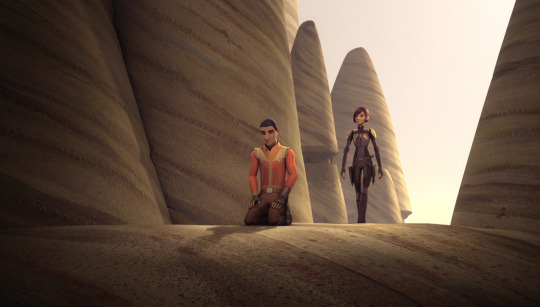
I don't really know if the parallels between Sabezra and Kanera are intentional considering how Filoni talks about the former, but Ezra does become Kanan (even has a whole stretch arms sacrifice) and Sabine does become Hera (Deep grief for losing him) and not in a "The kid got this from his/her parent." sense, but in the sense of that the situation is really similar, which is interesting because it wasn't like this originally.
Ahsoka made Sabine's grief towards Ezra not being by her side all the time a thing.

Instead of simply letting Sabine's mission be about bringing Ezra home like in the original animated epilogue, Filoni complicates things a little bit by implying that Sabine is not doing this for Ezra, but for herself. Beyond that, almost every character notices how devoted she is to him and it even confuses some of them.
Thrawn, for example, has studied Sabine. He is well aware that Ezra is her compatriot and friend and yet... he is confused by her choice. Sabine states "You wouldn't understand." and then accepts to be stranded on Peridea just to see Ezra again. Once she found him and even after hearing he wants to get home, she did not say a word about Thrawn being his only ticket home. Instead, she simply enjoys time with him.
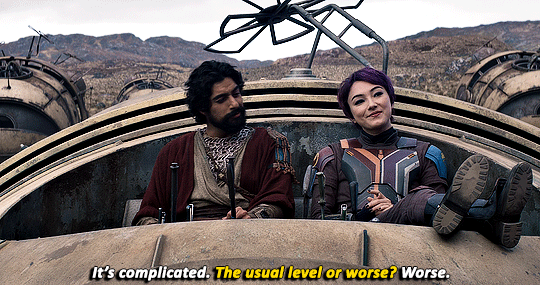
If you know Sabine Wren, you know that she would never ignore a huge Imperial threat and put in danger people like Hera, who is definitely an older sister type of role model to her, or feel that Ezra is the only family she has, so I do understand why people think she is very distant from the original show.
There might be a reason for all of this. A reason that I'm not sure Filoni wants to dive into, but the way he's been writing Sabine, the vagueness every time Ezra is the conversation's topic, feels like she has fallen in love with him during his absence and honestly? This makes far more sense than any other explanation.
We've seen in Star Wars before, fiction in general, that love is blind. Sabine's focus on finding Ezra is described by Baylan as something that blinds her. Not only this would justify her out of character attitude, but also the parallels with Kanan and Hera.
Star Wars live-action TV shows this year have been interesting to decode. In both The Mandalorian season 3 and Ahsoka season 1, there's a lot of subtle implications that characters want to build a life with somebody.
Mando does this in Chapter 22 - Guns For Hire, an episode surrounded by romantic love, where a droid bartender tells Din and Bo that human life is so short and then they look at each other. They want to be together, but that has not been verbalized yet. It is still very much in the subconscious.
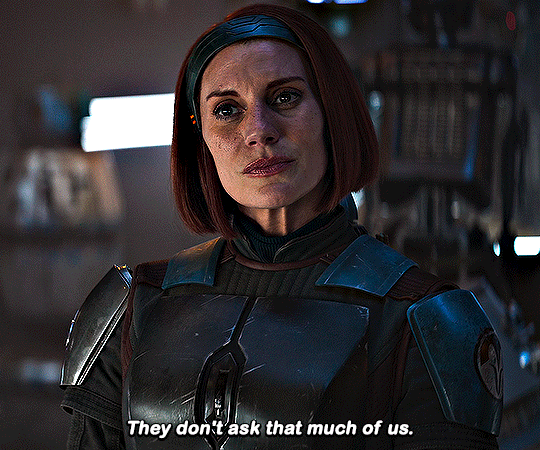
Ahsoka does it in Part 7 - Dreams and Madness, by showing Sabine's lack of urgency regarding Thrawn and simply enjoying Ezra's company. It really implies that this was what her mission was all about: Be with Ezra. Her real desire is build a life with him, but that desire is still in the subconscious.
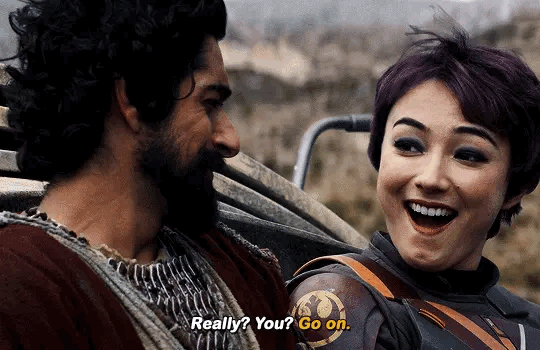
I believe Favreau knows all of that when it comes to Din and Bo.
BUT DOES FILONI KNOW THAT WHEN IT COMES TO SABINE AND EZRA?
#sabezra#ezra x sabine#sabine x ezra#ahsoka#the mandalorian#rebels#mandoverse#dave filoni#a little bit of dinbo for good measure#star wars
97 notes
·
View notes
Note
hi hello!!! I’ve been reading your Horropedia stuff and oh my goD the way you write him fills my itty bitty heart with glee- would it be alright if I asked for a character analysis on him? I’d love to hear your thoughts on him!! ༄⋆。˚✵ ໒꒰ྀི ⸝⸝´ ꒳ `⸝⸝ ꒱ྀི১

;R1999 HORROPEDIA - General Headcanons

Compilation of headcanons and analysis on Horropedia as a character and other related things.

TYSM! I'm very happy that you like my horropi posts! my horroposting!!
I don't know much about the horror genre or horror culture because I get scared very very easily so I don't watch many horror movies, but I'll do my best to deliver a good analysis of our boy o7

On the subject of horror, ableism and neurodivergency.
It goes without saying that Horropedia's character revolves around the horror genre. In this bullet point, I'm not aiming to list every single reference to movies or horror culture, but to tackle his relationship with it and how it gives further context into his personality--as well as how his heavily implied neurodivergency is meant to bring focus into the ableist ideals and practices within the St. Pavlov Foundation.
The very first part of Horropedia's storyboard and his 01 Story explains the origin for his love of horror AND affinity for tinkering with technology: his adoptive grandfather, described as a failed researcher and forgotten horror novelist.
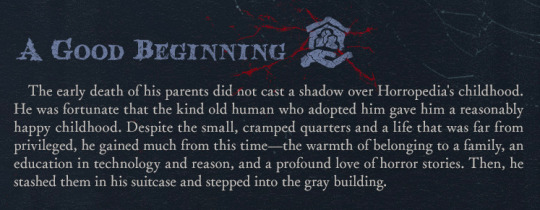
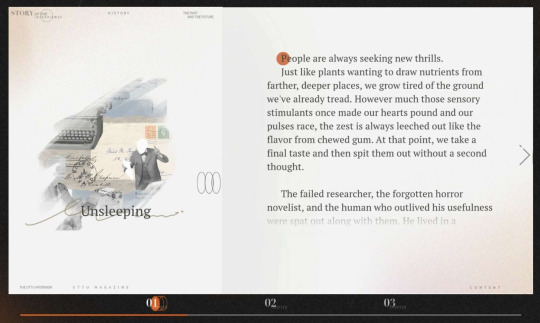
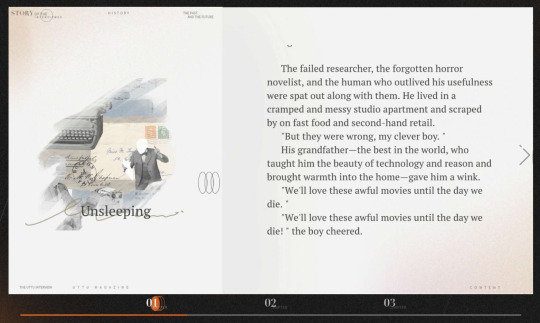
In these excerpts, it is VERY clear that Horropedia and his grandfather loved each other despite the poor living conditions. This aspect of community and family, as well as a strong sense of self and individuality is very important, because it goes against EVERYTHING that the Foundation stands for.
Compare the "role models" of the Foundation with the "troublemakers"--on one hand, we have Sonetto and Matilda. On the other, we have Vertin and Horropedia. All four act as parallels and foils of each other in this aspect. I think everyone is more familiar with Sonetto and Vertin, so I'll begin with them to make this whole tangent easier to digest!
Both characters are direct opposites of each other, but their origins are similar: neither of them has any sort of strong ties to the outside world. Sonetto does not know about her biological family. Vertin was the youngest arcanist to join the Foundation, and vaguely remembers her mother. The key difference is that Sonetto hasn't shown any interest in finding about her biological family, adapting perfectly to the model that the Foundation aims to instill into their students--whereas Vertin's character focuses a lot on loneliness, on finding a community. Because Sonetto lacks this support, this solid ground in which she could cultivate her own identity separate to her martyr and obedient dog role, she's considered the best of the best. And because Vertin keeps stepping out of these ideals and strict guidelines, clinging onto her own sense of self and individuality, she's considered a troublemaker.
Now, let's focus on Matilda and Horropedia. Unlike the previous examples, these two HAVE families outside of the Foundation--which are a very important part of their lives--and it's implied that both of them chose to join the Foundation, unlike Sonetto and Vertin who had no choice.
We already discussed Horropedia's grandfather. When it comes to Matilda, it's stated in one of her Stories that the only way for her busy parents to show affection and give her the time of day is through academic success, which explains why she's so hellbent on being the best. Family is very important to both of these characters. Both of these characters also suffer within the Foundation because they have strong identities and lives that the Foundation does not agree with. In Chapter 03 "Nouvelles et Textes pour Rien," the very first stage shows the way Matilda, the newest student in class, is immediately put down by the rest of the class.
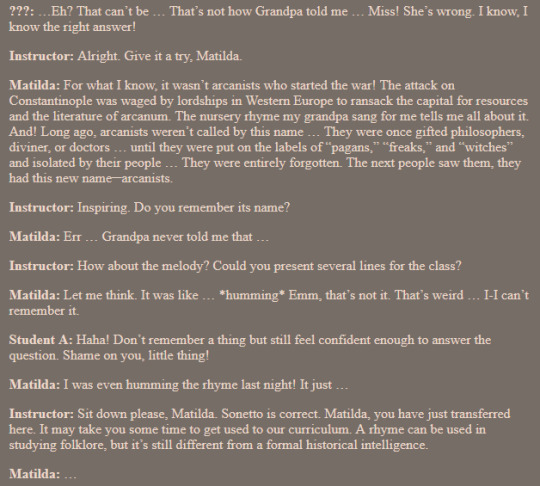
In this context, Matilda is being cast aside and ridiculed because her knowledge (of arcanist origin, coming directly from her grandfather) and her inability to give proof (note how mankind considers knowledge discovered or passed down between arcanists as "inferior," as seen in 1.3 "Journey to Mor Pankh", because they cannot verify it themselves).
How does this relate to Horropedia?
Well. The second part of his Storyboard shows the connection I'm trying to make.

Horropedia went through a similar experience. Both he and Matilda were ostracized by their peers because they didn't neatly fit in within the perfect model of a Foundation arcanist. We even see that he had to abandon his love for horror, instead "blending into the quiet campus." Their uniqueness, their history was slowly washed away.
So what is the difference between the two? How are they parallels and foils of each other? The difference is that Matilda, like Sonetto, was assimilated into the Foundation's ideals, whereas Horropedia was able to break free and retain his sense of self. The things he loved, the things that made him himself.
His Monologue voice line expresses this sentiment perfectly:
We all experienced the past where we were denied, distressed, and lost. That beautiful building, the white cradle, cut off all the "inconsistent" parts from us, in order to shape us into a "better" self … All in all, I am relieved that I am still me, and you are still you.
We see time and time again throughout the main story and sprinkled throughout other events, the Foundation is an organization that advocates for order and peace--something that they believe can only be achieved through the assimilation (or taming) of arcanists. They are written in a very specific way that shows how oppressive they can be to every single minority, not just related to neurodivergency. It's intersectional oppression.
It's just like horror.
Horror as a genre has an undeniable connection with communities such as POC, LGTBQ+ or neurodivergent and disabled people. Or just women in general! These groups have been demonized in one way or another in these movies. At some point, we have seen caricatures of people like us used to scare the masses.
...And in some cases, we've reclaimed certain aspects of it. Take one of the latest movies for example, "Lisa Frankenstein", or an older piece of media such as "Carmilla," a book that might be the origin of the predatory lesbian stereotype.
To me, it makes a LOT of sense that a character so heavily coded to be autistic or neurodivergent has a hyperfixation as loaded as horror. Fundamentally, Joshua and horror should not go together--because his Medium is "Logic," which contradicts the whole nonsensical and fantastical aspect of the horror genre. This is the subject of his interview with Pandora Wilson, actually!
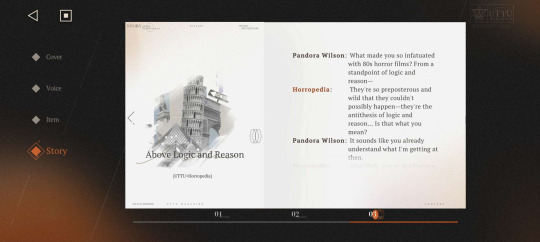
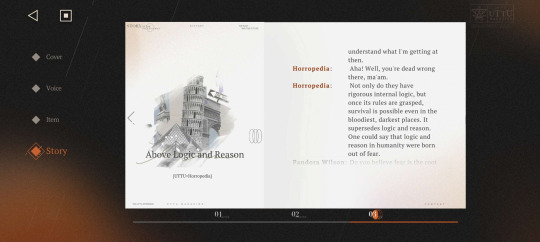
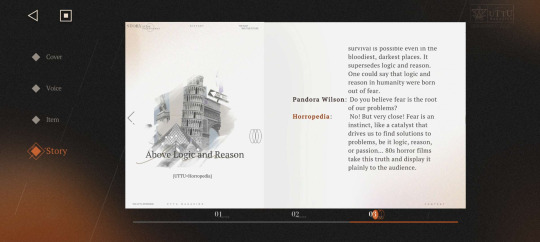
In here, he explains how horror has its own set of rules and guidelines, a "rigorous internal logic" as he puts it, which allows anyone to survive--as long as they understand how horror movies work. We see this aspect of him in action during the 1.2 event, many many times! We see the way he interprets it, how it relates to his way of thinking and his life, how he embodies horror as part of his life--it's in his chosen nickname, Horropedia--it all falls into place rather nicely!
Horror can only make sense if you take the time to study the laws that govern it, when you pay attention to the details.
A lot of the discussion surrounding Horropedia is obviously about his hyperfixation with horror, how he would act in a slasher movie, if he would make fun of certain tropes and this and that... Which is fair! That IS the whole point of his character!
But I hope I was able to emphasize just how meaningful his connection to the genre is. It goes beyond a classic hyperfixation that could wear off in the future. Just note the description for his i2 Garment "Screamism":
A little monster under the sheets and a steadfast guardian of the heart.
Details and things I had no idea where to fit in that first bullet point.
I hope these analysis and this entire blog gave away the fact that I'm also extremely neurodivergent and my special interest is overanalyzing things to an insane degree. These are the details that I HAVE to share with others or I'll explode, but I don't know where exactly fit them in the previous bullet point.
Related to this whole discussion about horror, ableism and neurodivergency. Horropedia's Night voice line mentions "The Man in the Frame."
Fine. I've always considered "The Man in the Frame" to be a conventional horror story. But when I myself stay in a frame … I finally realized it's really horrific.
I discussed this voice line with some people and some interpret this as a reference to the way characters in the main screen can turn into paintings. However, I believe this is a reference to the neat, little mold that the Foundation and the School of Discipline insist on using to raise their arcanists.
"The Man in the Frame" is a Russian animated short by Fyodor Khitruk, which you can actually watch here on Youtube--it's only 10 minutes and it's very interesting! I actually watched it to understand what Horropedia was referring to.
For those who don't have time for it, the short follows a man living within a frame and the different phases of his life. At first, it's a simple rectangle, four black lines caging him--when he falls in love, he gets out of this frame, but returns to it. Each phase shows him slowly working to "better" his frame, so it's more elaborate and ornate like those coworkers with higher positions. Until he refuses to step out of this frame, now at the top, even turning a blind eye to the suffering of others who ask for help, ordering everything to be put within more and more frames, his own becoming more and more claustrophobic until there's nothing left of him.
Of course Horropedia finds this story terrifying now that he understands what it's like to be suffocated by conventional and strict rules.
In this same vein, I want to talk about the fact that every character (except Tooth Fairy, since we don't know her real first name) in the 1.2 update has a name that starts with J--Jennifer, Jessica and Joshua.
Horropedia's name is said to reference a movie named "Joshua" from 2007. I'm not going to watch this movie because its premise sounds scary to me and I would like to sleep tonight, BUT the poster for this movie is relevant to the discussion of "The Man in the Frame".
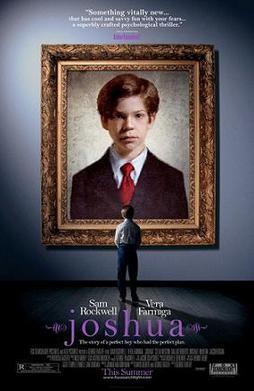
If someone has seen this movie and would like to add their two cents about it and how it might relate to Horropedia, please, by all means! I would love to hear what you have to say!
Next thing I couldn't fit in: Horropedia's items.
A character's items are meant to give us a little more insight into their lives and important aspects that the game wants to highlight about them. If you've read my previous analysis of Dikke and Tennant, then you know what I'm taking about. One of Horropedia's item stands out to me.

His glasses allude to his fanatism and devotion to his interests. His gadget set alludes to his logical side and intellect, the technology that his grandfather taught him. But what about the green tie clip? There is nothing outstanding nor worth noting about this clip, other than the fact that it's green.
Why does it matter that it's green? Because green is Horropedia's color.
It is the main representative color in his design, the one that pops up the most in his i2 Garment and sprites, the color of his shirt and monster slippers, the color of slime and ooze from horror movie's practical effects, the color of the entire 1.2 event. It is the color that, in this case, represents the aspect of horror.
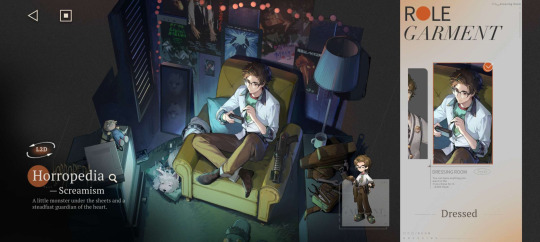

It's the color you see once you understand Horropedia more (by raising his level and insight) and the color that is subdued and hidden by default in his regular sprite, only seen in very specific areas as shown below.
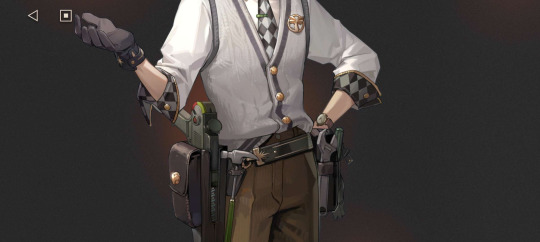
Perhaps this is an extrapolation on my part, I'm willing to accept that if it's ever confirmed, but with the amount of detail given to each character and their items, I think it makes sense for this simple, green tie clip to mean much more than "oh hey, Horropedia wears tie clips!" the same way Tennant's third item is a direct display of how much New Delhi meant to her despite the lies she tells in her voice lines.
Note the first phrase Pandora Wilson uses to describe this item: "A green line cuts through a black-and-white checkered world." To me, this alludes to Horropedia being an outlier within the Foundation, as someone who fought the system and remained true to himself despite everything.
He is the green line that cuts through this checkered world, everyone knows him and his eccentric nature, he fully embraces his status as a problem child and even gives Jessica tips on how to avoid being brainwashed by the School of Discipline in her own event.
The next and final part of this bullet point is more of a personal observation?
I've seen a lot of people focus on the fact that Horropedia would poke fun at every single horror trope because "they're too predictable" and I feel like this is not quite right? Yes, he plays the role of That One Guy who is very aware of the sort of movie he's in, who serves mostly to explain horror tropes to the audience and be self-aware or joke about how certain aspects make no sense when we think logically (outside of the context of horror) about them. But we also see how serious and eager he is during the whole 1.2 event. And tropes exist because they work, because they are part of the formula in each genre. Being able to spot a trope does not mean that the media you're consuming is bad, it's just something that you were able to pick up on because it's part of the genre.
From my understanding, shock value and surprises are part of horror. That's why we have these twists at the end, like the reveal of a killer who survived being killed by the protagonists. Yes, Horropedia DOES mention that jumpscares are outdated, but we understand jumpscares as a cheap and fast way to scare people by catching them off guard, like Five Nights at Freddy's for example. But the element of surprise is still important, it's just something that this cheap tactic and actual horror share.
Logically, horror makes no sense because there's no way for a zombie apocalypse to happen, or for ghosts to haunt you and so on and so forth. This is why we suspend our belief, to fully immerse ourselves in the worlds being presented to us--one must understand the logic within the context of these movies, rather than apply outside logic to it.
This is a really long tangent just to say that Horropedia wouldn't exactly be the type of guy to engage in horror with such bad faith interpretations or opinions, since his To The Future voice line does focus on the impossible, the surprises that the future might bring. Expect the unexpected, as he says!
Future, future, hmm … Our future slides back to the past. What else would be impossible then? Perhaps that blondie would accept an award on the stage of any film festival, or the lame horror novels written by my grandpa would win the Nobel Prize in Literature, haha … I mean, you can always expect the unexpected, my friends!
There is also the fact that his Inheritance Skill is LITERALLY named "Jump Scare," because even though it's an outdated practice, it requires a lot of redirection--to ease the viewer into a false sense of safety only to hit them with the real thing, which fits the way Horropedia's Incantations work! He shoots randomly or with his eyes closed and his shots are redirected to the enemy! It's like his Ultimate description says:
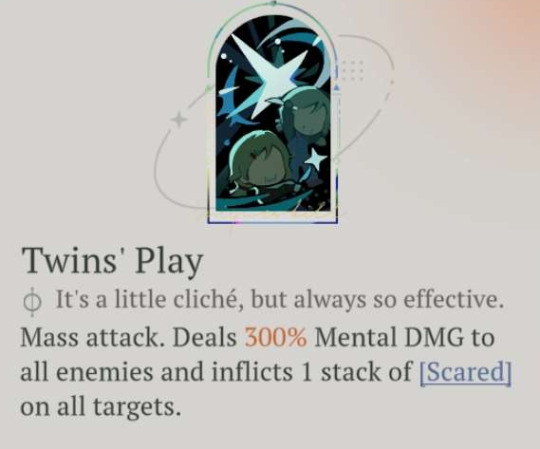
With that, I think I got everything off my chest and out of my brain. Sadly, I don't think I have many headcanons that I could ramble about without making this post longer than it should be?
I guess I like to think Horropedia is left-handed and wears his accesories on reverse to throw people off, if that counts? I also like to think that he just naturally assigns a piece of horror media that he knows to everyone he knows in his brain, and that's how he knows them as or remembers them. Oh! I also think he could figure out the plot of FNAF if he wanted!
#reverse 1999#reverse: 1999#reverse 1999 horropedia#horropedia#i blacked out for 3 hours to write this#almost 4 actually#i love him can you tell
52 notes
·
View notes
Note
do you ever think about the parallels between damon and graham and paul and john? the childhood best friends and inseparable creative partners, one is the pusher for the dream, and the other one is the arty emotional live wire, the jealousy, competitiveness, emotional breakdown, and dissatisfaction/unhappiness with their dynamic. eventually, one gets a new creative partner, and the wedge becomes a chasm. yet only one of them got the opportunity to fully reconcile while the other was robbed of it.
of course, they're not the same, and the level of success does make for a lot of that separation. but I see how much time and effort it took for damon and graham to rebuild their relationship, knowing it couldn't go to what it once was but still working to repair it. glad they did, especially when you hear paul say that one should never put off telling someone you love them.
yeeeesss this has been a point of great interest for myself and certain other rpf scholars on this site (hi @elena-ferrante). watching paul in get back really reminded me of damon lol...i think it's interesting that part of the tension between d&g and j&p is that the domineering control freak "spokesman" member of the pair comes across as the one calling the shots but is in fact so full of admiration for and places such a high value on the opinion of the other that he becomes sort of deferential to him... i think they all struggle(d) with their identities and public images being intertwined. but i also think that there is/was more love between them than we could possibly understand from the outside. i really sincerely think that john and paul would have reconciled if they'd been given enough time.
speaking more broadly to your point about the wedge & the chasm: i think another thing about why bands are so interesting and why they capture the public imagination is that they frequently present this homosocial fantasy of companionship that is very much rooted in an adolescent configuration of life , i.e. hanging out with your friends all the time, doing whatever you want, responsible for only yourselves, obligated to each other out of a shared passion. and that lifestyle is not compatible with The Institution of Adulthood, i.e. stable career, marriage and family-rearing, which still feels compulsory—if not totally inescapable—for most people in [heterosexual] society. a band can be a world unto itself but it is not the real world. there are soooooooooo many examples of bands falling apart once a member gets married and/or commits to a new creative partner because that development inevitably ruins the fantasy on which the band was built, consciously or subconsciously. the real world comes careening back into focus...and you can't ever get that old life back once you've deviated from it.
i think the assumption within heterosexual society that homosociality is something that one "ages out of" is very pervasive (and homophobic, natch, but we don't have to get into that now). that homosocial relationships—or even friendships more generally—are always ultimately secondary to romantic relationships (specifically marriage) is something that i think a lot of people struggle with as they move further into adulthood (i know i am lol). it just happened on a much more drastic scale for these guys because of their fame.
also so much of the stuff in this post is very damon & graham coded...

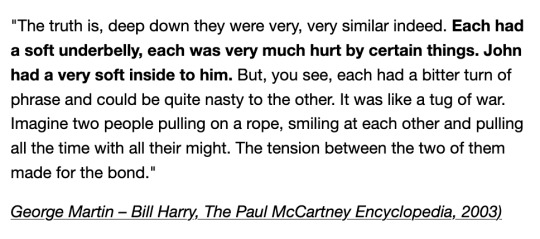
well anyway let's all kill ourselves.
28 notes
·
View notes
Text
People shit on Elemental for its race/culture allegory looking even more reductive and rigid than Zootopia's on the service, but I think it actually used it super well. It feels a lot more like a very broad and fable-ish metaphor than the sort of hard world-building with direct racial parallels found in Zootopia. Zootopia aged poorly cause it was so fucking direct in its parallel imagery to real world oppression with the police angle, whereas Elemental is just generally about the experience of being an immigrant. The way it uses the infrastructure of the city being actively built for some and harmful to others is really clever, I adored how they used that.
It also helps greatly that Elemental was written by a POC from the perspective of the marginalized because it helps make the metaphors feel more cohesive. The choice to make Judy the main focus as a perpetrator of the systemic predator oppression that greatly mirrors real world anti-blackness aged like milk to me, it screams white guilt complex. And the fact it spends a lot of time not engaging with forms of prejudice besides the bunny oppression until it gets to that feels very flat. Elemental immedietly explains its main allegory very strongly and from the perspective of those it affects, so there's no fluff or time spent ignoring the issues from the privileged perspective.
Literally the thing that will instantly kill your fantasy oppression metaphor is being white guilty about it or not thinking super hard about what you're paralleling if you're going to be as blunt as Zootopia. Stuff like accidentally giving the oppressed group a reason to be oppressed as you do with the predator-prey dynamic. It's just the biggest fucking red flag and shows little understanding of why these systems exist irl. In Elemental the metaphor obviously uses a lot of imagery to show that the fire people are meant to be east asian-coded, but beyond that its content just being a story about class and immigrant families. About being from different worlds and feeling like they're impossible to combine, because of experiences and backgrounds, which is expressed as being fire and water.
Unlike being a bunny and fox, that imagery is a bit less loaded and can be turned into a sort of mutual harm as it is in the film with Wade being at risk of evaporating as muxh as Ember is at risk of being put out. And, in the end, it's found that water can just bubble a bit as the metaphor for a compromise. Which is fine enough and where the more fable-ish approach to the allegory became clear to me.
It's also used very cutely for their personalities too in a way that comes back to the background divide - Ember being fiery, anxious, and high-strung from pressures of supporting her community, and Wade being all blubbery and emotional but mellower because he lives in a supportive upper-class family. Its just a lot cleverer on a couple of levels than the bumbling between 'predators are black and brown people but also their oppression is bad but also they are dangerous but also its cause of a conspiracy, and also small prey are kinda like white woman and theres intersectionality but its shown horribly'.
Despite Ember's racial coding, no matter how you code Wade's family it doesn't matter because it is simply about - 'you live in a city that has integrated for you, and I don't' - which could apply to an upper-class family of any background, cause it's more of a class thing now. Even if he was black-coded (which Ive seen from fans likely because of his VA, I dont remember if he was in the films text), it still works cause their ARE affluent black families whom by nature of having been here and integrated are in that privileged role over a poorer immigrant family of any other race.
Allegories for class or upbringing usually age better, the systems that create those are a lot more basic and less loaded to parallel on a surface level than racism or misogyny. Not that they CANT go really deep, but it's easier to not come off as blatantly offensive as long as you're not like a eugenicist about it.
#shut the heck up#elemental#film and animation#media analysis#i didnt pay attebtion to all of elemental but from what i did it worked good#people clown on it too hard#its still kinda basic and whatever but it deserves some props
26 notes
·
View notes
Text
I know Lantern Hill Book Club finished ages ago but I just now (I know it’s ridiculous) read the last two chapters and here are my two cents.
LMM endings continue to be bizarre and rushed but in the way that Emily’s Quest is, by putting all the doubt of the supposed happily ever after on the last page. The light-headed happiness of Robin and Andrew is legitimate just as Emily’s gladness at marrying Teddy is, but LMM lays out her problems nevertheless. Jane still has to be the interlocutor to her parents which is a dreadful place for an only child to be (not to overshare but I’ve been there and it can be Bad), they all still need to live half the year in Toronto which is far too close to 60 Gay and Grandmother for my liking, and there is absolutely no resolution with the elephant in the room of Aunt Irene. Andrew has his vocation and potentially Robin is growing a spine, but have they grown up enough to talk through things like normal adults?
LMM overuses (imo) the romance novel trope of a misunderstanding leading to alienation—again paralleling Emily and Teddy, Robin and Andrew patch up miscommunication but not incompatibility. That would be a lot for a book of this purview, in some ways, since it is supposed to focus on Jane and Jane’s (occasionally erroneous) POV on situations. But like Emily, it echoes into grown-up issues so deeply that the reader’s urge is to have a grown-up resolution, or maybe a little epilogue. I see why her publishers wanted a sequel at that point.
But I ALSO think it’s telling that LMM didn’t want to write one. I wonder if she didn’t really know how to carry the whole world forward in a satisfying way considering Jody’s exit was a trifle slapdash and both the ideas of a happy Robin-Andrew and a conflicted Robin-Andrew feel painful to delve into. The first one would be dull—LMM thrives, as any good novelist does, on conflict—and the second would just carve out the same dynamic as in this book, only more sordid because there would be no eucatastrophe a second time around. The only way I could see a middle ground is if Grandmother and Aunt Irene conveniently died or if there were a significant time jump, but neither solution were the types of things LMM did. Jane has already become old before her time; I really feel like Maud must have had no more coming-of-age arc to complete without the intense self-identification she had with Emily (writing and mental illness) or Pat (house worship and mental illness).
27 notes
·
View notes
Text
So the show is going for this message of "Ahsoka is more than a legacy of death and destruction" but they do this by having her.... just not kill a fake vision version of Anakin? Cool, she's more than a warrior, more than just death and destruction and war. So then WHO IS SHE?
And this show doesn't have an answer. Who IS Ahsoka without the death and destruction? Who does she WANT to be? What traits would she rather focus on than the ones Anakin chose to instill in her that she knows are going to lead her down a bad path?
Like I get that they wanna focus on the master/padawan relationship thing and so they ONLY want to focus on Anakin, but personally, I think this is where it would've been really great to see Ahsoka's OTHER relationships in order to explore the other influences Ahsoka has had on her life that make her MORE than just "death and destruction."
This is where it would've been nice to see more of Rex and their friendship, or fleshing out the friendship with Barriss that was implied in TCW but never explored, or even more of Ezra or Hera from back in Rebels era, or Plo Koon with her as a very young child. Obi-Wan would've been nice, but Ewan's busy and that's an unrealistic expectation (however the narrative parallels of Obi-Wan to Anakin and how Obi-Wan represents the Jedi and the GOOD that is in Ahsoka from the THIRTEEN YEARS she spent growing up with the Jedi before she ever even MET Anakin, coupled with the fact that Obi-Wan considered her at least partly his Padawan as well, would've been really great). This allows you to showcase who Ahsoka actually IS outside of her relationship to Anakin and the legacy he forced upon her as his apprentice. She is more than Darth Vader's apprentice, she is more than an Order 66 survivor, she is more than a failed Jedi Padawan. She was someone who loved her men and joked around with them, she was someone who could cry on her friend's shoulder, she was someone who enjoyed being a mischievous kid, etc etc. Literally ANYTHING.
Because Ahsoka can't be a good master to ANYBODY if she doesn't know who she is. Anakin fails as a Master because he doesn't understand or accept who HE is and so all he passes on to Ahsoka are some basic Jedi platitudes and a lot of Sith manipulation along with pieces of his own trauma, none of which do her any good. If Ahsoka can't discover and accept who she ACTUALLY is, how is she ever supposed to guide someone else on that journey?
This is why I feel like this show should've been TWO shows: one to explore Ahsoka and who she is and letting go of that connection to Anakin and the ways it's weighing her down, and one to follow up on the Rebels finale that actually allows the Rebels characters the focus they deserved. One episode to explore this for Ahsoka was NOT enough because we got to the end of it and.... we still don't know who she was any more than we did before this. She chooses to live? Cool, was she choosing to die before this? Was she just wandering around waiting to die? Was it a metaphorical death of falling to her own darkness? There's not enough in the four episodes leading up to this to tell us any of that and this episode didn't have NEARLY enough time to actually get into it as deeply as they needed to. Ahsoka is a cardboard cutout just throwing out one-liners that sound deep and meaningful but when put back in context and analyzed for like... 60 seconds, there's nothing there.
#star wars#ahsoka tano#ahsoka show#ahsoka series#sw ahsoka#ahsoka 2023#star wars ahsoka#ahsoka spoilers
42 notes
·
View notes
Text
Luz’s Character Finish Is Bad
“All I’ve ever wanted... was to be understood!” only works from a meta perspective. From the perspective that she is a nuerodivergent (though never stated in the show), LGBTQIA+ character. Groups that, yes, right now are struggling to be understood, accepted and shown love.
Here’s the counterpoint: Who the fuck hasn’t shown Luz understanding in the past season and a half before then? And obviously, villains don’t count because they’re kind of, you know, evil. Unless Luz wants to say everyone in existence needs to show her understanding which is commonly a villain’s motivation as it doesn’t allow for other people to exist.
Amity here is the second biggest (we’ll get to Camila when we talk about the actual scene itself) because their relationship is literally built on shared understanding and interests. This actually gets worse when you look at Amity’s character. She acts entirely ready to just live in the human realm with how excited she is about it. Obviously stops studying magic to focus more on studying human world stuff to prepare for it. She even goes as far, just like King does, to LEARN SPANISH FOR LUZ.
Now... Can a brain refuse all of this? As someone with Avoidant Personality Disorder: Absolutely. Does that excuse in the context of a piece of media? No it fucking doesn’t without some real explorations and deep dives into why/how the character dismisses ALL of it. Because otherwise, it’s the same to use magic to wave something away. They’re emotions, we don’t have to explain it. But if those emotions don’t make sense from ANY perspective within the show... It’s an audience’s right to call the show out for it.
If a character who is very business like, to the point, and quiet suddenly goes on an hour long rant in front of the hero instead of just killing the obstacle in front of them like they have literally any other problem of theirs, you can ‘explain’ that as an author. Come up with excuses. It’s not the audiences for not believing those excuses though when the text actively goes against what is being shown.
Which... Well, let’s talk about the potential excuse that Luz has never been shown understanding before the Isles? That until Gus and Willow, she had no friends and that King and Eda still did take half a season to start showing care for her and her interests. Okay. That’s all fair and technically works within the text of the show.
But Camila exists. And the first special detailed, pretty clearly, how much Camila has backed Luz up every step of the way in her creative journey. That Camila has never rejected her daughter and shown her as much understanding as is quite possible for a mom to show her daughter. She only held back on this ONCE. And I want to mention that the only time Willow and Gus ever ‘turn’ on Luz, is ONCE. Hell, rule of threes: Put the Bat Queen/Owlbert in there.
And all three have the same complaint for Luz: You need to stop caring about your interests and goals at the point where they start hurting people.
Now, actually, I do want to point out that if this were properly interrogated and a proper part of Luz’s arc, it would be an AMAZING parallel to how the Collector behaves. Make the two both characters who are so in love with their view of the world and excitement for their ideas and games that the rest of the world stopped mattering at one point. Only Luz has learned and the Collector has not.
But then Camila, in the moment before Luz’s grand statement, apologizes for that moment. Apologizes for making Luz have to consider other human beings. Apologizes for the one moment that she has ever held Luz back on... And that’s dog shit.
It frames this moment not so much as Luz wanting understanding as much as her wanting to be told there will never be consequences for her actions. That no one around her believes she even CAN make a mistake. and the rest of Camila’s speech, and more problematically Luz’s response, or lack there of, only reinforces this concept.
After all, Camila makes a very rousing, very real point about the mistakes people make. She admits to a lot of her own and ostensibly, THAT is the part of the speech that the majority of the first two specials have been building up to. Luz has been torturing herself over a mistake she believes herself to have made (which how stupid that whole plot point is is literally another blog I’ve made) so tackling that, tackling the idea that sometimes you just don’t realize the full picture of your actions and you need to know the difference, makes sense.
And Luz ignores all of this. Blatantly and bluntly. She doesn’t react to ANYTHING her mom says until her mom reveals she’s a secret nerd. That she is actually one Luz’s kind which is... A problem and a half in and of itself and I’ve talked Camila’s character too in the past.
And Luz ignoring all of that begs the question of why none of that matters to her? She’s made such a big deal out of it after all. Acted near suicidal because of it. Unless... The problem wasn’t the mistake. Unless the problem was consequences she couldn’t guaranty she could fix or were too hard to fix. Too inconvenient and painful.
One example of this is perhaps the cruelest thing Luz does: Amity quotes back to her about wanting to spend their future together before stepping through the portal. At that time, Luz knows that her plan is to not go through that door. To let it close with Amity on the other side. Supposedly, Luz loves this girl. There are pictures of them going on dates in the human realm despite Luz having had this question on her mind for a while now... If not the answer she came up with.
But she says nothing. She fully intended to not give Amity any sort of closure and let Amity, up to the very second they were separated, believe Luz still intended to spend their future together.
The level of callousness and selfishness required to break up with someone like that, let alone abandoning ALL of her friends who would have to deal with that emotional turmoil while dealing with the new form of the Isles, is just beyond me. It’s not something you can excuse with being a teenager. It’s not something you should excuse with nuerodivergence and FUCK YOU if you do. It is simply a god awful moment for Luz’s character. Period. And outside of meta explanations, like the writers knowing Camila would go through and so knew Luz wasn’t going to abandon Amity and thus didn’t think about Luz’s actions, there’s no getting what it says about Luz’s character.
Let alone mixed with this. Mixed with her blatantly not caring about any lessons about mistakes or having a conversation about mistakes. She just wants to be told she’s special, act like she’s special and continue to believe she lives in a fantasy. That she is the hero and once she stopped believing that fantasy could come true, she was willing to let the entire Isles burn without even trying to help it.
Because understanding to Luz isn’t recognition of your ideas, beliefs, interests, struggles, etc. It is all of that plus not being critical of anything she does. That any amount, literally any amount, of push back, of suppression, means you hate her and just don’t ‘understand’ her.
It’s gross, it’s bad and as someone who was born autistic and suffers from depression now... This isn’t how I want to be understood. And I would hope it’s not how most want to be understood.
========
I have a public Discord for any and all who want to join!
I also have an Amazon page for all of my original works in various forms of character focused romances from cute, teenage romance to erotica series of my past.
I have an Ao3 for my fanfiction projects as well if that catches your fancy instead,
If you want to hang out with me, I stream from time to time and love to chat with chat.
And finally a Twitter you can follow too!
96 notes
·
View notes
Text
So obviously Vamp and I have been tearing our hair out since last night trying to make sense of this new direction of the Darby/Nick/Fox/Christian/Lucha storyline, mostly because it just doesn't line up with everything else anymore, and finally we were like the most obvious reasoning tends to be the correct one, which means it isn't supposed to make sense because it no longer does. I really think that we were correct in that Darby was originally planned to win the TNT belt last weekend, and they changed the plans; this is why it feels like the story took a hard right turn. Because it did LOL.
One of those things that always ends up tripping me up is remembering that these stories are living, breathing ecosystems that can and do change at a moment's notice for a wide variety of reasons. So when you try to use the old pieces to justify the newest parts, they don't match. This is why Christian's focus swung around to Darby instead of Nick, where it had been, and why the comms didn't match the acting (Vamp pointed out that comms kept saying Nick was so mad at Darby for Fox, but!! Where?? Their Wed match undid all of that in one fell swoop!). But it's worth noting that most of the time when a storyline changes, they pivot away and leave things sort of just open. They haven't done that here. For whatever reason, despite Darby not being anywhere near the TNT belt anymore, all our players (minus Swerve) are in a holding pattern. They aren't shifting the story to something else, they are filling time and keeping everyone exactly where they were.
This means that most likely last weekend's outcome was changed, and as far as we can tell, there would only be two reasons for them to scrap that and push it later, which we assume they are since Christian cannot seem to stop getting all up in Darby’s business. (We thought originally that Darby was actually injured, and so they changed a potential title run, but I think he's proven that isn't the case.)
The first reason would be them pushing Darby’s win to WrestleDream, since it's in Seattle. I wouldn't necessarily put it past TK to do this, but it felt VERY short notice since Darby was literally doing a press tour two days before the PPV. We can't rule it out. They could easily be keeping them in this holding pattern because it got shifted a month later, even though I really don't see why anything would matter that much since Darby’s shot at the TNT title came a ridiculous 6 weeks after he "won" it anyway. (We have thoughts on why that happened, too.) BUT. You know. TK doesn't sleep for like 5 days and fucking invents new PPVs, so, anything is possible. 🤣 Maybe someone decided this was SUPER IMPORTANT, idk.
The second reason to push a storyline out and keep everyone in a holding pattern is because a player you need is unavailable at present. And as far as we can tell, there is only one person out who would be important to this storyline. (Swerve has, at this point, exited the narrative, as he has moved on to Adam Page.) Initially, we toyed with Fox not going to London having changed things, but he is right back in the story where they probably wanted him, and his lack of involvement doesn't explain why Christian and Lucha are inexplicably still tied to this. To be completely honest, we can't make this fucking story work without Jack. We have no other options!!! Everything else has been struck!! WHY.
I suspect we are going to see more of this holding pattern? And obviously we have gone through a lot of what this means for Nick, what this means for Darby, etc etc. But, man, what a wrench this threw in our theory crafting. It really took us awhile to just be like NOTHING HOLDS ANYMORE BECAUSE SOMETHING CHANGED.
I assume Vamp will be along shortly to add to this. There's some weeeeird pieces that don't line up with actual histories (like Christian taunting Darby that he will never have a belt when... Darby is the longest running TNT champion?) but DO line up with the parallels they seem to be running, so it's kind of a mess. I'm thinking that we are putting 10x more hours into this than they are. 🤣
#jack perry#darby allin#christian cage#deep dive ring posts#here we go again#ya girls on our theorycrafting once more
24 notes
·
View notes
Text
Love Defying Fate
My analysis of The Left Hand of Darkness. Warning: MASSIVE spoilers below the cut:
Why Genly Ai Was Supposed to Die Instead of Estraven: the rational, mythological, and narrative threads that hint that Genly will die in The Left Hand of Darkness and the way that Estraven reverses that fate.
The Rational Reason
Estraven is simply better suited to Gethen than Genly.
Genly is constantly cold and requires more food than Estraven which nearly kills him during his journey across the Gobrin Ice. He nearly dies from veridical and kemmer-preventing drugs that have few side effects for normal Gethenians. He gets frostbite at temperatures that barely affect Estraven. He needs Estraven’s help to cross the Gobrin Ice, both because he is not as familiar with Orgoreyn’s geography as Estraven and because he is unaccustomed to long ice treks and does not know the supplies needed. Additionally, Genly is unable to navigate politics with the native understanding of Estraven. If not for Estraven’s intervention, he would have been put to death by the King of Karhide. Later on, he would have died in the Orgota Voluntary Farm if not for Estraven’s rescue.
We can easily surmise that without Estraven, Genly would have died at the beginning of the book. Genly says as much himself.
The Mythological Reason
Le Guin makes it no secret that The Left Hand of Darkness will be a tragedy. The most apparent of these hints is the inclusion of several Gethenian tragedies in Genly’s account to the Ekumen, almost all of which include the death of a lover. It’s worth noting that Le Guin could have created any kind of story to flesh out the lore of her world but instead chose romantic tragedies, specifically to prepare the reader that the book at large is also a romantic tragedy. From an in-story perspective, Genly chose to include romantic tragedies in his narrative out of all the stories on Gethen because they lend context to the story he has lived. As readers, from the focus of Genly’s account on the death of lovers, one can surmise what will happen to our protagonist and deuteragonist who share, in Genly’s words, “a friendship that might as well be called love.” One of them will die..
The first romantic tragedy related to Estraven is “The Place Inside the Blizzard” in chapter 2. In it, a brother banished from his hearth for vowing kemmering with his sibling wanders the Pering Ice, which borders the Gobrin Ice that Estraven and Genly later cross. While travelling, he meets the ghost of his brother, who committed suicide. The living brother has a clear narrative parallel in Estraven. The dead brother in Arek. We can guess that, like the living brother, Estraven was banished after vowing kemmering with his brother Arek. We can also surmise that Arek committed suicide, and that Estraven is faulted with causing the suicide, a grave offense in Karhide. Estraven outlives Arek, just as the protagonist of “The Place Inside the Blizzard” outlives his kemmering.
The second myth related to Estraven is “Estraven the Traitor”. In the story, the two hearths of Stok and Estre are enemies because of a land dispute. When Arek, the heir of Estre, gets lost in the snow, Therem of Stok rescues him and nurses him back to health. During this time the two vow kemmering with each other. A group of Stokven find Arek of Estre and murder him for being in Stok territory. Months later, Therem of Stok gives birth to the son he conceived with Arek of Estre. He delivers the son to the hearth of Estre and names him Therem rem ir Estraven. This Estraven grows up and becomes the heir of Estre. After being injured, Estraven is rescued and nursed to health by his parent of the flesh, Therem of Stok. Because of the rescue, Estraven vows to end the feud between Stok and Estre. He gives up half of the disputed land to Stok. Because he betrayed his own hearth’s wishes to bring peace, he is known as Estraven the Traitor.
There are two characters related to our modern Estraven in this story. The first is Therem of Stok, who shares a first name with Estraven. His kemmering is none other than Arek of Estre, again hinting to the fact that our Estraven and Arek were kemmerings. Therem of Stok also rescues and cares for Arek of Estre just as our Estraven does for Genly. Like in “The Place Inside the Blizzard”, the character associated with Estraven lives while the one associated with Arek dies. We see a theme building: Estraven is destined to outlive those he loves.
(The second character related to our Estraven is Therem rem ir Estraven who shares both Estraven’s first name and landname. Both end up being called Estraven the Traitor, the first for bringing peace to Stok and Estre and the latter for trying to bring peace to Karhide and Orgoreyn.)
Both of these myths are not related just to Estraven, but also to Genly, who is associated with Arek because Estraven hears his mindspeech in Arek’s voice. Because of this, Genly takes on all the parallels associated with Arek. He is the brother who killed himself in chapter 2, Arek of Estre who was shot in enemy territory, and also our Arek, Estraven’s dead brother. Genly is mythologically destined to die, just as Estraven is destined to outlive him.
It is worth noting here that there is a character in The Left Hand of Darkness that reverses his mythological fate: Ashe Berethy. In the myth “The Nineteenth Day” Ashe goes mad from trying to glean meaning from a foretelling, eventually killing his kemmering. Our Ashe, likely named after the man in the myth, ensures that he will never seek meaning from a foretelling by joining the Handdara, who believe the prophecies they give are meaningless and strive for ignorance. Effectively, Ashe obtained the opposite of the fate his birth name outlined for him.
Estraven too, gets the opposite of his fate.
The Narrative Reason
Genly expects to die, or at the very least does not mind if he does.
Being First Envoy is basically a suicide mission. Genly remarks that First Envoys on other worlds are often killed and sometimes imprisoned. He must know that his chances of surviving his own mission are low due to the track record of his predecessors. His job consists of being dropped into an unknown culture and climate with no outside resources. He is alone and unprotected, facing threats due to both his political ineptitude and ill suitedness to the cold climate of Winter.
At his most idealistic, Genly seems to see himself as simply an extension of the Ekumen’s will. He takes solace in the fact that when he dies, the Ekumen will simply send more Envoys. The mission will continue with or without him. This attitude is best summarized in Genly’s question to the Foretellers of Otherhord Fastness: “Will this world Gethen be a member of Known Worlds, five years from now?” According to Genly, this question what he “most wanted to know.” Despite it being his question, Genly does not include himself at all. He does not ask if he will convince Gethen to join the Ekumen, only if Gethen will join. He cares more about the Ekumen’s overall success than his own survival.
Genly’s disregard for his own life is also shown in his willingness to block his own routes of escape. The ship that he came on lies disassembled in Karhide, something which Genly allowed to happen shortly after he arrived. Because of this, he has no means to return to the larger ship in orbit. He also eventually gives his ansible, his only means of communication with the Ekumen, to the Orgota. Genly doesn’t seem chagrined by how vulnerable he is because of the few resources the Ekumen has given him. He has no way to escape Gethen and no way to protect himself. This seems to almost be a prerequisite for being First Envoy: a willingness to be a sacrificial lamb to make way for future envoys.
Estraven’s Defiance
It is rational that Genly should die as someone unfamiliar with Gethenian cultures and biologically unfit for Gethenian cold. His mythological ties to Arek hint that he is fated to die. And Genly accepts the inevitability of his death through his narrative choices and does not fight to live.
But Estraven fights for him. Estraven almost dies escaping Karhide so that Genly can roam free. He risks his safety and freedom to rescue Genly from the Orgota Voluntary Farm. He starves on a harrowing journey across the Gobrin Ice, delivering Genly from a country where he is safe but Genly’s death is certain to one where Genly is safe but Estraven is a fugitive.
Estraven remarks several times that the Ekumen does not value the lives of its First Envoys. Compared to Estraven, they don’t. The question of why Estraven gives up so much for Genly cannot be answered solely by a desire to accomplish Genly’s mission. That is only one of Estraven’s motivations. The other is a love for Genly.
Estraven understands the Envoy system and knows that after a few years with no response from Genly, another Envoy would be sent to Gethen. After Genly was sent to Pulefen Farm, Estraven could have given up on him and started preparing for the next Envoy. He could have waited and ensured that the mission was accomplished without risking himself. But instead Estraven endangered his own life, not for the mission, which would have continued anyway, but for Genly.
For the Ekumen’s mission to be complete, there must be a death. Historically, the First Envoy is supposed to die to pave the way for others. Thematically, there must be blood in the mortar before the keystone of the mission can be placed. The mission to Gethen was always going to end in a death and all of the signs point to that death being Genly’s. The Ekumen meant it to be that way and Genly himself was prepared for that eventuality. But Estraven defies destiny by throwing himself on the blade marked for Genly. This is the heart of The Left Hand of Darkness: a love so deep that it reverses fate.
#the left hand of darkness#tlhod#lhod#genly ai#ursula k. le guin#left hand of darkness#therem harth rem ir estraven
27 notes
·
View notes